Business
Capitalist Sage: Business Leadership in Your Community [Podcast]
Published
5 years agoon
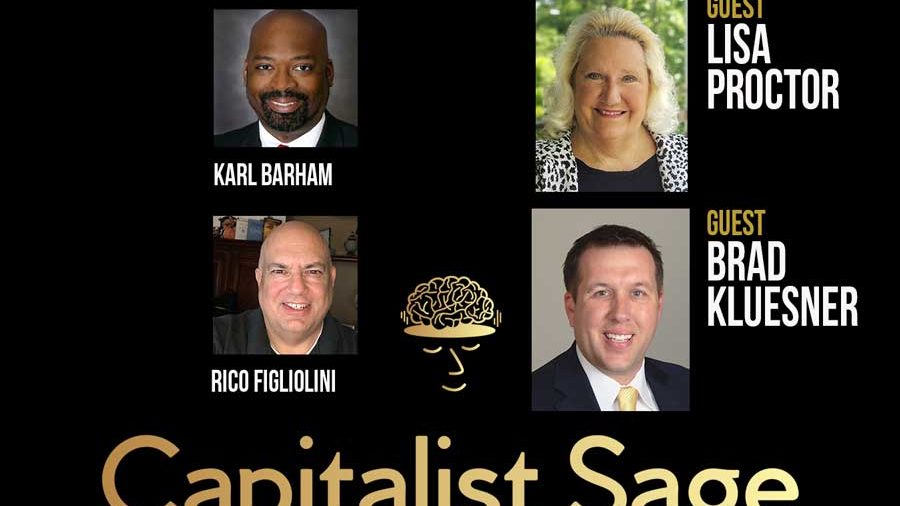
Summary
On this episode, Karl Barham and Rico Figliolini sit down with Lisa Proctor and Brad Kluesner, leaders within the Peachtree Corners Business Association. We discuss the benefits of joining the PCBA, how it can turn the city into a home and community, and how businesses can get involved and give back to their communities.
Resources:
Peachtree Corners Business Association: https://www.peachtreecornersba.com/
“And all I can say to people is, plug in. There are some things that I would not have known, that there’s business opportunities in the future that maybe didn’t give me that immediate sale. Or that – you know, I always say to people because I work nationally and locally, or internationally, I may not give a direct sale because I went to a meeting. But the relationships that I built were invaluable.”
Lisa Proctor, President, PCBA
ABOUT LISA PROCTOR, President, PCBA
Lisa Proctor is the President and CEO of Sanford Rose Associates – Lake Lanier Islands providing executive search and consulting services in the placement of mid to senior level executives, C-Level Management, and high-level individual contributors across multiple industries including Financial Services, Banking, Insurance, Technology, Business Services and Professional Services on a national level.
Lisa is an Executive Founding Member of the Peachtree Corners Business Association. She served two years as the Membership Chairman and now serves as the President of the PCBA. Her primary focus for the PCBA includes Member Engagement, Business Networking and Growth, and continued support and growth of Community Outreach.
Lisa and her husband Jay have lived in Peachtree Corners for over 25 years. When they are not volunteering or working on JP’s fishing jigs, they enjoy spending time at Lake Lanier boating, fishing and relaxing.
ABOUT BRAD KLUESNER, Chair of Community Outreach. PCBA
Brad Kluesner is a Financial Advisor here in Peachtree Corners with an office in the Forum. He and his wife Amy moved to the area from Indiana when she was recruited to an Atlanta law firm. Brad’s career focus has been financial services and education in different states around the country. After running schools for the past seven years, he became excited for the opportunity to return to finance and run his own business. He attended the University of St. Thomas in St. Paul, MN and graduated with bachelor’s degree in philosophy and earned two master degrees from the University of Notre Dame in education.
Brad has been active this past year in the Peachtree Corners Business Association, the Friends of the Gwinnett County Public Library, Inc. and the Rotary Club of Peachtree Corners. He also volunteers through the Catholic Charities Leadership Class 2017, St. Pius X Advancement Committee, and different ministries at St. Brigid’s and Mary our Queen Church.
Podcast Transcript:
Karl [00:00 ]: Welcome to the Capitalist Sage Podcast. We’re here to bring you advice and tips from seasoned pros and experts to help you improve your business. I’m Karl Barham with Transworld Business Advisors, and my cohost is Rico Figliolini with Mighty Rockets digital marketing and the publisher of the Peachtree Corner Magazine. Rico, how are you doing today?
Rico [00:17 ]: I’m doing just great.
Karl [00:19 ]: Why don’t you tell folks about our sponsors?
Rico [00:22 ]: Absolutely. We – they just opened this week. Gwinnett Medical Center’s primary care and specialty center here at Peachtree Corners. So they just opened on the – just Tuesday, I think it was. So they’re joining this community. They’re going to be providing premier services, and they are a sponsor of the pod – of this family of podcasts – Capitalist Sage, Peachtree Corners life. So we want to welcome them as part of the one. Atlanta Tech Park of course. This is the place that we’re doing this podcast out of. This is a great place. I mean – I – it’s just phenomenal. The activity that’s here, the amount of workshops and – there’s something that’s actually going to be staged tonight that’s here also.
Karl [01:05 ]: Yeah. They’ve got events here all the time. I think it’s one of their cyber events. Fintech – and I think they have coming up – Women in AI – is coming up. And in a couple of months we’re gonna have cryptocurrency workshops here. And if you’re really interested there are even a little bit of improv professional free workshops offered every month.
Rico [01:28 ]: Really? There you go. So this is a really hopping place and a great place to do these podcasts, which we do twice a month here. And as well – the third sponsor – well, it’s more of a media sponsorship for us because we are a media sponsor for Smart City Expo Atlanta. That’s coming in September. It’s the first North American expo and offshoot of the Barcelona World Congress Expo that happens. And Curiosity Lab, Prototype Prime, will have for the first time here, an offsite demo of the 1.5 mile stretch that’s going to be the autonomous vehicle lab. So we’re proud to be a sponsor of the Smart City Expo Atlanta, and you can find more information just by googling that or go to SmartCityExpoAtlanta.com and that’ll take you there.
Karl [02:21 ]: For folks who don’t realize what Smart City – if you think about what information and data do cameras and so on is able to do in a city – improve service, helps us direct traffic if there’s an accident and so on. The companies that are leading in developing the technology for the next generation of cities are coming into Atlanta and we’re being featured here at Peachtree Corners for that, which is fun and great to know.
Rico [02:45 ]: Yeah. And that stretch of land, well at least up until City Hall, will be completed to a degree, so there will be a lot of things going on on the day – on the first day of the expo here.
Karl [02:55 ]: Fabulous. And that’s in September, right?
Rico [02:58 ]: September 10th – well actually 11th through the 13th.
Karl [03:02 ]: Okay, that looks good. Well, today’s guest is Lisa Proctor and Brad Kluesner from Peachtree Corners Business Association. They’re here to talk to us a little bit about what these associations due to help local communities – business communities – the community overall. And let’s start off by just having you guys introduce yourselves and maybe some of the roles you play in the organization. Lisa?
Lisa [03:27 ]: Sure. My name is Lisa Proctor, and I’m the president of the PCBA. I started with the organization as a founding member when the organization was created in 2012, and made the – volunteered to be the membership chair and did that for a couple of years and then stepped into the role as president. So I’ve been doing the president role now for a couple of years and always love to continue to build and grow the town and the organization.
Karl [03:56 ]: Fabulous. Brad, how about you?
Brad [03:58 ]: Yes – a couple years ago I joined the Peachtree Corners Business Association and I just said to myself, “I want to meet people who live and work and play here.” And the best way to do that is, I’m just going to go to every meeting every month. And I didn’t know anybody and eventually, I knew one, and another person, and a year later, Lisa asked me to volunteer to be the chair of the community outreach. So this is my first year on the board connecting businesses to the community.
Rico [ 04:24 ]: Wow. You mentioned something about volunteering. The organization – how is that structured around the members?
Lisa [04:30] : The organization is all 100% volunteer. Which creates its own little challenges because trying to coordinate everybody’s schedules and everything, but the great things about Peachtree Corners and the greater metro Atlanta area is – we actually recruit volunteers, and we say to people, “You don’t have to recruit or be part of the organization 100% every day, every month, every – tell us what you can do, but what you commit to, please do what you commit to. And if you can only do it for one month, if you can – if you want to be on a committee – if you want to just help check people into an event. Tell us that’s what you want to do, we’d love to have your help.” But that way, I think it’s a great way for engagement. The reason I volunteered to do the membership is – I have lived in Peachtree Corners for over 25 years, and because I work nationally and internationally with my day job, what happened is, I discovered I didn’t have children in school, I didn’t know people, so it was a great way for me to get to know the community. So just sitting at the membership, checking people, seeing those faces together, getting to know people – kind of like Brad – is saying, I’m going to the meetings, I’m learning who these people are, and I discovered I got to make some great friends and some great business associates just by putting myself out there and doing some simple things. So I think that’s the best way to do it.
Karl [05:54 ]: I know for folks that worked in large corporation and corporate environments, you build a social network within your company and you can always tell it by LinkedIn – you’ll see how many people they’re connected within their same company. But if you’re a small business owner, you don’t have that advantage of all these people to be connected to. So I could see how being a part of a business association that gives you connection with other business owners that are like yourself is a good way to build your network around that – around that.
Lisa [06:24 ]: It is. Not only is it – what you find is, you don’t have to have the answers to everything, you don’t have to have all the solutions. You will meet people or you will get to know people that say – “You know what, I have somebody you should meet.” So it’s not necessarily who you meet at the event, it’s taking the time to get to know people who feel comfortable enough referring you to people that you need to know. And I think those are the best relationships.
Brad [06:50 ]: Yeah, I would say, you know for me, good business starts with relationships where you trust somebody and you know them. And then they can help you or you can help them, and it just becomes a community of givers, really. And that’s what I’ve seen.
Karl [07:05 ]: So your great example of when you started this, of started joining and being a member of the organization. Were there specific things that you saw helped you personally as you started venturing into your own businesses?
Brad [07:21 ]: Well for me, I was a little bit of the opposite of Lisa. I just moved here just a couple of years ago. A lot of people are moving to this Peachtree Corners area. And you get here, and you didn’t grow up here, and you don’t know anybody. And so, you want to know leaders in the community. You come to these events, and you just start with a conversation. And for me, it became a home. You know, I lived here first, I had a house. But then the Peachtree Corners Business Association made it a home and a community for me. And for a guy from a small town, that’s important.
Rico [07:52 ]: Where’d you come from?
Brad [07:54 ]: I came from – I grew up in a little town called Jasper, Indiana, but I moved here from Indianapolis.
Rico [08:00 ]: Small town, right? Not too big. You know what I like about Peachtree Corners Business Associations and some of the other, you know, associations and chambers around the city is that, if you really want to, like you did, be involved – it’s one thing being a member of an organization, so you feel like you’re there and you show up at some events and stuff, you’re fine sort of doing your thing. But it’s always better to be part of – part of the group and it does consume some time, but it becomes fun I think, and it also provides better connection to the group – to the leadership.
Lisa [08:39 ]: Absolutely. Well in fact, one of the biggest things is, when people are saying “what organization should I join, and how do I decide?” My first question to them always is, “What do you want to get out of it? Why do you want to join it? Because if you just want to take in – pay a check, we’ll take your money. Happy to do it. But you’re not gonna – next year, when it’s renewal time, you might not renew because you didn’t get anything.” So come to things, get engaged in things. We try to do events different times of days, different kinds of things, just to say, we’re not going to solve everybody’s schedule – we’re not gonna do that. But we want you to feel comfortable engaging on that works for you.
Rico [09:18 ]: You know what I find that – since we started the magazine, and this used to happen before, too. But now with the magazine, we’re pro-businesses – new businesses – and some of the same questions – “What do you think we should do to get more involved in the community?” You would think they would know. But, you know, so you encourage them. So the first thing is the PCBA, you have the Southwest Gwinnett Chamber – those are certain places you should join, and then they will help you get out into the community because giving into the community is always the best way to reach the community.
Lisa [09:53 ]: Well, and I think you hit it also when you said, with small businesses, one of the things that was really important to me when I started my business was – part of our mission statement is to be very philanthropic in the communities. And we make donations in our clients’ communities, but what we found was that the outreach committee and having that part of the organization – that’s why we built it – was a way for all the businesses to have a meaningful impact in the community. Because as a small business, I can’t write a check to sponsor every single thing – the parade, the festival, the run for the corners or light up the corners – all these things and here comes the high school and here – but the great thing is, with the business association, we’ve donated over $75,000 back into the community since we created the committee in 2013, is when we created it. So, you know, and you’ve seen it. With being able to do scholarships and things like that, as you look at that, what have you seen?
Brad [10:53 ]: Well, every recipient has been so moved because the need is so great and nonprofits are such tight budgets that they just say, “Anything you can do to help us, we’ll appreciate it.” And so we give them a voice in the community, we give them recognition by coming to the events and sharing their stories, sharing some of the causes that we’re working with to the whole business community. And if you don’t know what’s going on, nobody’s gonna be able to help you. And so that has been very impactful for them.
Karl [11:27 ]: I talk to business owners – they’re always asking about ways to improve their business. And one of the top things is always the top line and revenue and how can I get more revenue. And I always explain to them – what are they doing to get more known, build awareness? And a lot of businesses have figured out how to use community involvement, charity – whether or you’re sponsoring a high school team – to help generate awareness for the product and services that they provide. What I like about these business groups and organizations – it gives you multiple ways to get in front of different – but they’re also helping you vet the organizations that actually make more impact with each dollar that you donate or each service that you do, so you don’t have to go and be a researcher and figure out, “should I provide money to this cause or that cause?” These groups have been there for years, they know the organizations and the types, and you can talk to them and consult and say, “this is the type of impact – it’s education. Here are four ways you can give back to education.”
Lisa [12:29 ]: Right, well, it’s so funny that you say that because one of the things I continue to find is I find that there are so many great charities in Peachtree Corners or the greater Peachtree Corner area that support our community. And I didn’t even know about them. I don’t know if you did, but we started looking at the list, and I said – “We’re gonna have to categorize them because they’re getting so long on our website that all of a sudden you’re like, I’m getting lost in the weeds.” There are so many – by the time you look at the schools and you look at the assistance league – most people didn’t know when they opened and we did the ribbon cutting for the Assistance League. They’ve been in existence in the greater metro Atlanta area for years – I didn’t even know what they were. And so it allowed me to say, “oh my gosh, they do so many things.” And really help them and they’re all volunteers as well. But it’s just something to learn.
Brad [13:21 ]: And what I love about the Peachtree Corners Business Associations is you get to meet the leaders of these local charities and nonprofits – they’re a lot of causes nationally, and you always send in money, and you know you’re helping a great cause. But at this, here in our community, the leaders come to their events and you know them and you know their character and you know their story and they’re helping your neighbors, and that’s very powerful. That’s what I like.
Karl [13:45 ]: I always like introducing the concept of, every small business owner should have a board of directors. But the trick is – people that could advise them on business – I have one area of expertise and Rico has another – and if you want to talk about marketing strategy, you want to talk about financial strategy or legal tactics, you want someone that you could have a conversation with, and most often you have to pick up a phone or google or pay a fee. But part of these organizations will allow you to build your own personal board of directors. There are people that have done what you’re doing – they’re five years, ten years ahead of you – there’s people with different subject matter expertise. And you can start forming those relationships where you and pick up the phone and say, “Hey Brad, I’ve got a question about X.” Or “I’ve got a question about Y.” And you can have a conversation and see if you need further help and they can help guide you with that. Is there any other advice that each of you can give to a person of something that they can benefit when they join organizations like this?
Lisa [14:44 ]: Go ahead.
Brad [14:45 ]: I was gonna say – you have to have that relationship so you can pick up that phone. You know, I met Karl at one of these events when I was on a tour, and now I’m on the podcast, and that starts with that relationship. And now, you feel comfortable calling me, I feel comfortable calling you. But if you call me and I don’t know, I might know someone in the Peachtree Corners Business Association that I’ve met and had lunch with them too, and I think that is the real value of the association.
Lisa [15:09 ]: And what I find is, if all you’re gonna do is go to the event and do what I call the drive by – the business cards and you’re handing them all out and you never follow up or you never do those things, and it’s getting to have those conversations that are the casual things – understanding what people do. It’s amazing to me how many things that I don’t even realize the number and depth of the connections I have, and somebody will say, “I’m about to start this” and I – there’s a staffing firm, and I won’t tell you who, but she was saying to me, “Lisa, I’m about to go after this in the market.” And I said, “well let me just share my experience. I did the same thing, and if you do this better than me, let me know how that works for you, but I wasted a lot of time and got a masters degree on the street doing the wrong things.” And I was happy to share that because I could tell she was excited about what she was doing and she was just ready to do it. And I – she was going after the financial surface industry and I was like, “that’s very regulated, and if you’re not that familiar with it, you need to know.” So I think you’re spot on with – you know, people who are willing to give back to others – um, my natural tendency is, I’m happy to give back because, you know what? Somebody did that for me. I didn’t learn all these things because I’m brilliant. I learned the hard way. But I had some great mentors and great leaders that helped me along the way.
Rico [16:34 ]: That’s great. I feel like – I mean, I love talking shop. I love talking about business, about start ups, it’s just – I feel – when I see other people – especially younger people – getting into business and launching something, I feel like I wanna help them. It’s just like – it’s cool, it’s exciting. I’ve been there before, I’ve done different things, so that’s what I find also – that network of business people – to be able to just talk shop sometimes and share what you know.
Lisa [17:02 ]: Well, what I’ve also found is how much I can learn from them. Because when they tell me what they’re going to do, what I’ve learned is, I’ll say, “Tell me why you’re gonna do that.” And it’s interesting to find out that I’m not always the expert, I don’t always know anything. And sometimes when they tell me, I say, “Hmm, that’s an interesting way.” And so, it’s caused me to be more open thinking the other way, and not just assuming that I am that person who knows and can do that. And it’s been pretty humbling, especially when it comes to technologies and all the things. Cause I’ll say, you know, let me run this by you. I’m about to put this piece together for marketing, and they’ll look at it and go, “Hmm.” And I’m like, “You don’t think so?” And they’re like, “Well, it’s probably wonderful, but I wouldn’t use it or I wouldn’t read it or I wouldn’t do – ” And so I think that’s the part that I love is – having more of that ability to collaborate in a safe environment. And you don’t always have to feel like you’re the know it all of everything. You can actually ask other people very safely, even in your role as you’re listening to them – I’ve probably learned as much from listening and hearing what they’re talking about, saying, “What makes you think about that?” Or just asking those questions and going, “You know, I was so busy doing all this, I didn’t think about that.” And that’s a good wake up call.
Karl [18:20 ]: You’re tapping into something when you think about just personal development. Most owners of business or anybody in small business – the thirst for development can make their – they don’t have peers that they can have conversations with. Most people report to them, no one’s gonna be frank with feedback on ideas. They’re gonna tend to want to agree. You’re both in leadership roles within the organization. How is that helping you develop personally, getting involved in leadership?
Brad [18:50 ]: Well, for me, I like learning from the mission driven leaders of organizations. And so, you know, we’ll give a $500 check to a nonprofit, and then I’ll kind of follow up and go on a tour and see what the operations are like and see how the executive director is managing the people, sharing the story and the vision in the community, and I think to myself, “What am I doing to make the community a better place? What is my personal mission? How can I help more people and how can I collaborate with more people around me like that person’s been doing?” So I’m always trying to learn from others who are successful. And that’s been one thing that I’ve gotten out of it.
Lisa [19:36 ]: And what I find is, it’s helped me broaden and learn more from people where – what happens when you’re in your little focus and your head’s down and you’re running business, you surround yourself with people that think like you do. Cause it makes it fast, and what I’m finding is, it challenges me to think more out of the box and step back from things before I just go ahead and do the ready, fire, aim. It makes me say, “Wait a minute, let me – it’s okay to take a step back. It’s okay to do.” And just as you were saying is, so many times, you forget to invest in yourself. And realize the cobbler’s kid has no shoes. And the thing I’ve learned is it gives me that of – “You know what, I need to step back. I need to learn that technology. I need to listen. I need to – it’s okay to take time to do this class, or, you know, go to this launch or go to this thing.” And for me, I have a bad habit of not giving myself permission to make the time.
Rico [20:33 ]: Do you find that because, I mean you’re a small business. How many people?
Lisa [20:39 ]: I have basically a staff of three. And then I have some contractors who work with me for about another four. And what helps me a little bit is, I also happen to be part of the Sanford-Rose franchise. So we have a hundred offices and I have two hundred people that are there to back me up, but at the end of the day, it’s still my P and L, what I’ve gotta do – I’ve gotta deliver. And so, at the end of the day, yes you’re big over here, but yeah you’re pretty small over here.
Rico [21:11 ]: And that’s why I think – you know, if you have your head down when you’re working, and because you’re a small business, you have to really work at taking that step back for a minute and say, “you know what, you’re right. Let’s go to that dinner or let’s do this thing” and not just working all the time.
Lisa [21:28 ]: Exactly. Well, and I think that that’s what we find when we tell people you need that engagement, you need to give that time. I think with entrepreneurs, you end up wearing so many hats that sometimes, you forget, “Wait a minute, I am supposed to be the leader. I am supposed to basically replenish my mindset and what I’m learning, and I can’t do that if I can’t get my head out of my computer, off my phone or, you know, getting out and talking to people.” And so it really, for me, that’s when people say, “It’s so much work.” And I go, “Well it is.” But I’ve rarely had anybody get me to do something that I didn’t choose to do. So for me, it’s a choice. It’s not a duty, or I don’t feel like it’s something I have to do. I choose to do it because I see the value, and I do think it’s helped me learn so much more. Look at how the city has grown in the last seven years and all that’s going on. And I don’t know if I would have been as aware of this stuff if I hadn’t been really in touch with it. And all I can say to people is, plug in. There are some things that I would not have known, that there’s business opportunities in the future that maybe didn’t give me that immediate sale. Or that – you know, I always say to people because I work nationally and locally, or internationally, I may not give a direct sale because I went to a meeting. But the relationships that I built were invaluable.
Karl [22:55 ]: It’s interesting, and if you think kind of individually about it, I’ve noticed we’re – at the state of the city – the mayor – a lot of people there are learning, listening about the city. How does these business organizations like Peachtree Corner Business Association help influence policy, help give input from a collective voice to the leaders in the political sphere but within the city? Because Peachtree Corners is going through a transformation, and it’s growing and there’s a lot of interesting things. What role can PCBA have in that?
Lisa [23:33 ]: I think that’s an awesome question. That’s actually one of our founding principles of why we created the PCBA. Is because it was unbelievable to me- 80% of the people who work in Peachtree Corners do not live in Peachtree Corners. So they can’t vote in Peachtree Corners. So if they don’t take advantage of the business association – we as an association don’t always agree on every policy, but what we can provide you is you have those opportunities – those city council – those mayors – we bring in speakers – we bring in in a very casual, business after-hour speaker type thing where you get to know those people. And you can actually talk to them and tell them what’s important to you, and if you didn’t have that forum, I don’t know if you would ever really do it. It’s amazing, like, when you mentioned the city – state of the city – I’m not sure how many people in that room were business people versus community people. I was there, and I went, but that’s been always one of our challenges is saying to the business people, “Plug in and know what’s going on. They do listen and there’s some real things” – in fact at the Lazy Dog ribbon cutting yesterday, one of the challenges that Lazy Dog had is that they cannot serve food to the dogs, which is part of their business plan, because of a Guinnett County health code issue.
Rico [24:59 ]: It might be a Georgia state –
Lisa [25:00 ]: It maybe also Georgia. I don’t know how much. But as they were talking, the city council were there, they were actually talking to them, saying, “Help us. We understand that it’s not just the city, but who do you know?” And something that basic and that easy – when people are in the community getting to know each other, that’s where they can have it. Now, whether that will change or not, you don’t know. But those things don’t happen if people don’t start those relationships.
Karl [25:28 ]: It’s funny, I think maybe all of us were at the State of the City. And you learn a lto of stuff that’s going in, but I think you had a good point – the mix of business folks to folks that might just be more living in Peachtree Corners was nice to see the mix there. And some of the vision of the city really impacts and is centered around business. Is there an area that you’re seeing in Peachtree Corners – we got local – where we could do better when it comes to supporting the business community?
Lisa [25:58 ]: I was gonna say – that’s a great question. I think it continues to be the way that we try and communicate to the business community. The thing that I’ve run into and maybe you’ve seen it as well – there’s so many ways that people can communicate. But it doesn’t mean they’re actually engaged. So what I have found has been a big help to us has been the Peachtree Corners Magazine, or doing podcasts, or doing different ways, cause people learn differently, people communicate differently. And I think being open to whatever those ways are provide the platform. So I think trying to figure out how we provide that – I think the town center – some of that central communication has helped. But we’ve got a long way to go.
Brad [26:48 ]: And I would say that, as a leader in the business community, take initiative. You know these causes are here, and take initiative and make a donation or volunteer. Don’t just wait for someone to ask you and then the event goes by and you say, “Well nobody asked me.” You’re leaders, you’re entrepreneurs. Take initiative and jump in.
Karl [27:08 ]: Well, I wonder what you got going on. I know there’s lots of events that are happening there, and maybe just tease up a few events that people should be aware, how they could find out more about the events with the Peachtree Corner Business Association.
Lisa [27:23 ]: Absolutely. Our website is PeachtreeCornersBA.com and all our events are listed out there. Probably a couple of the events that are nearest and dearest to our hearts is August 22nd, we have our annual charity event, and we are going to be doing Island Castaway beach party, Gilligan’s island style. And so their registration event is there. You can register for the event, find out the details. On September 26th, we’re gonna do business after hours at Anderby Brewing, which is our new brewpub in Peachtree Corners. And we’re super excited. And on October 24th, for those business people who need to build their personal brand, they get to come here, who is the LinkedIn guy – if you don’t know who he is, don’t miss out because he can help you build your personal brand as well as your business brand. And we also have our coffees – the second Tuesday of every month. Don’t – just very casual, very easy conversations like this, and you don’t have to be a member to come. And then stay tuned for some more of our upcoming business lunches. So we’ve got a lot of ways to do.
Karl [28:37 ]: Fabulous – so if you’re a business owner in Peachtree Corners, there’s so many ways to get plugged in. And starting out with a small business step – go to one of these events. Meet Brad, meet Lisa, talk to them about it, meet some of your neighbors, and you know, step up and be a leader in the community and get out there and get involved. So really appreciate – I want to thank both of you – Lisa and Brad – for your time today and just helping, kind of exploring, the different options around joining groups, being involved in the community and how collective action in the business group can really impact the community. We’d also like to think Atlanta Tech Park for hosting the Capitalist Sage Podcast. We enjoy our time here – beautiful facility to visit and take around. I thank Brad for introducing me to Atlanta Tech Park a while ago, one on the many ways that connection to these groups have helped me personally and to develop the business. Rico, anything we got coming up?
Rico [29:41 ]: Um, I mean, should – the last issue that just came out. Let me just put that up here. Peachtree Corners Magazine just covered this city’s big video and film industry in the surrounding areas, which is, you know, a three-part article, so it was kind of neat to cover that. Plus we covered a few other things like Anderby Brewery that just opened, which they have a dozen square-foot event space also.
Lisa [30:11 ]: It does – that’s where we’re gonna do it.
Rico [30:13 ]: There you go. So there’s that, and then the Peachtree Corners swim team – first time champions from Peachtree Corners for Guinnett Swim that happened just recently. So there’s a bunch of things in here – Fipe high school, high school kids that are doing it big out there in the world. One of them works for Space X right now. So I kind of made a lot of articles in here especially about Smart City Expo that’s happening in Atlanta. So there’s that.
Karl [30:39] : And if you wanted to check out some of these things digitally, where would I find that?
Rico [30:44 ]: Sure. You would go to LivinginPeachtreeCorners.com. And if you go there, you’ll find the digital edition of the magazine, you’ll find – we post there every week, sometimes every other day, different articles on there. And you’ll find all the podcasts there. So back history of these podcasts with Capitalist Sage, Peachtree Corners Live and the stuff I do with Brian Johnson, City Manager, which is that once a month Prime Lunchtime with the city manager.
Karl [31:10 ]: So you can listen, you can read, you can go online, you can find out what’s going on here. I’m Karl Barham with Transworld Business Advisor with Atlanta Peachtree. We help people, advise people on the best way to understand the value of their business. And when they’re looking to make a transition with their business, we help them with that, finding both buyers and helping sellers with that. And Rico – Mighty Rockets –
Rico [31:34 ]: MightyRockets.com. I do a lot of creative services, so anything that deals with social media marketing, online content, videography – I’ve been doing a lot of product videos lately for our companies in Charleston and Kentucky, so that’s been fun. And, so, a bit of that, we do a lot of creative services, of course the magazine also takes up a lot of time now, too. But it’s been fun, and these podcasts are – you’re the heavy lifter on the Capitalist Sage, so it’s been cool doing these podcasts.
Karl [32:05 ]: Oh, absolutely. It’s great to have great guests come in, local. You could find folks in the community – say hi to them in Sprouts or Engels when they’re out and about, set up a coffee and find ways to grow and improve your business. It’s the Capitalist Sage Podcast. We look forward to chatting with you some more on some future episodes. Have a nice day everyone.
Related
Business
The Forum Gives Sneak Peek of New Eateries and Community Spaces
Published
2 days agoon
July 24, 2024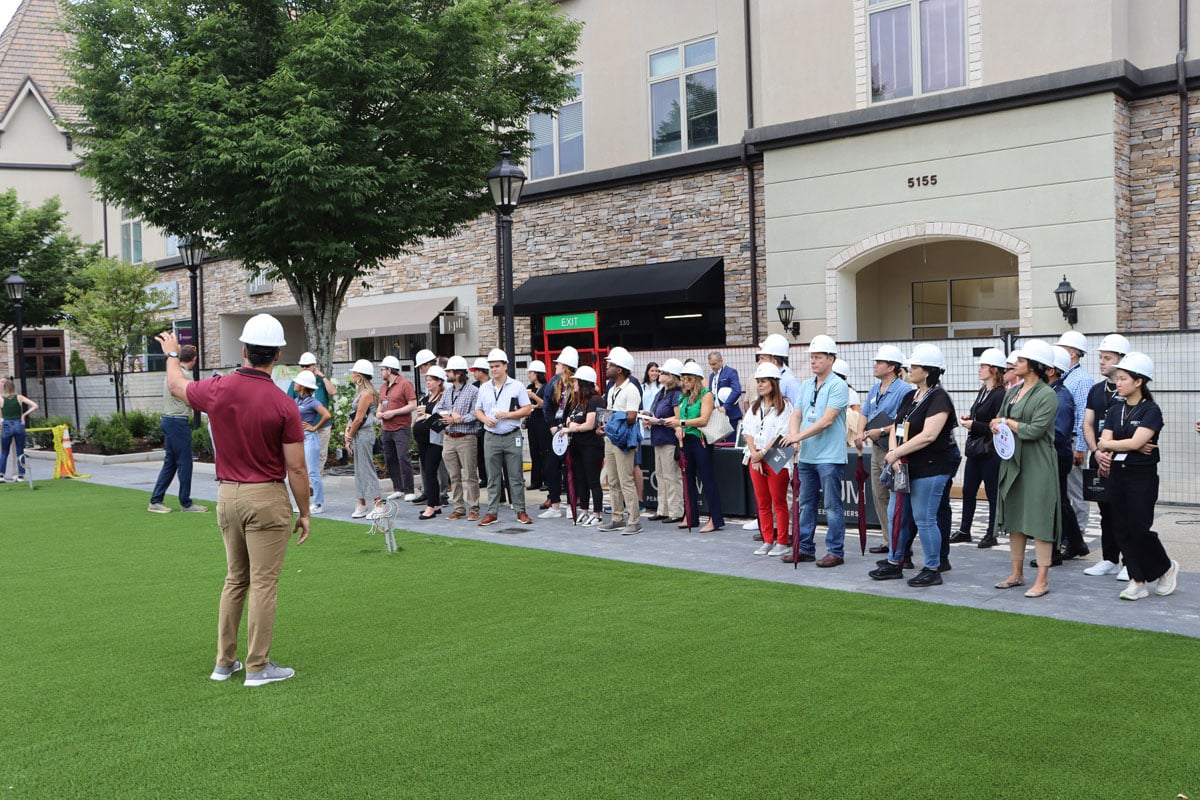
If you’ve been to or near the Forum in the past few months, you’ve probably noticed cranes and construction crews. The anticipation of the first phase of renovation of the 22-year-old retail center has left a lot of Peachtree Corners residents as well as nearby patrons excited to see changes.
The Forum administration invited the media for a hard hat tour on July 17. The event showcased the redevelopment progress ahead of The Plaza’s grand opening on Aug. 8.
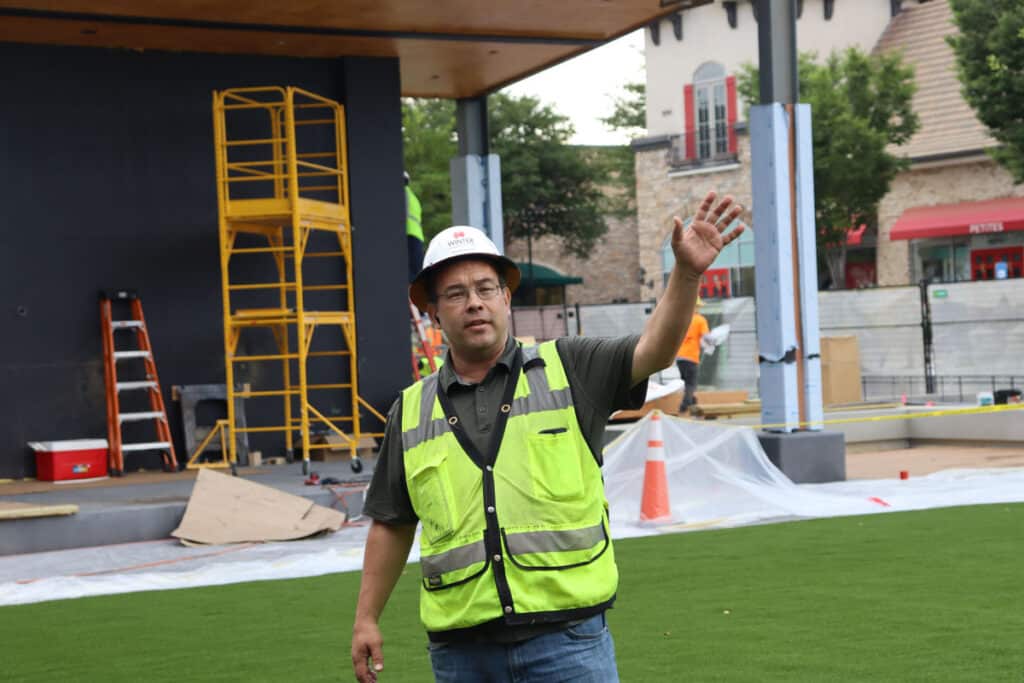
Scrumptious bites incoming
Executives from the development and leasing teams joined on-site management and led attendees around the new central gathering space, guest amenities and Politan Row, the newly created 10,000-square-foot food hall.
Dining concepts from veterans at Sheesh, Twenty-Six Thai and newbie Gekko Kitchen were the first food vendors announced for the space, which is expected to open in January.
“We can’t wait to introduce the Peachtree Corners community to our food hall experience,” said Politan Group CEO Will Donaldson in a news release. “Every detail from the design to the bar program to the cuisine is thoughtfully curated to inspire guests to not only mingle with one another but to connect with our incredible restaurateurs and discover new favorites.”
During the tour, Donaldson explained that eventually there will be seven different global cuisines in the Politan Row food court at the Forum featuring well-known and up-and-coming local talent. Once complete there will be a central bar, a private event venue and a covered outdoor patio.
“One of the things that we’re excited about is this unique design that we’ve come up with, that’s very specific to this area,” he said. “We’ll be open seven days a week for lunch and dinner. Whether you’re with a group for lunch or with your family, it works great for multiple settings.”
Twenty-six Thai owner Niki Pattharakositkul said the restaurant will work with local vendors to source the freshest meats and produce possible.
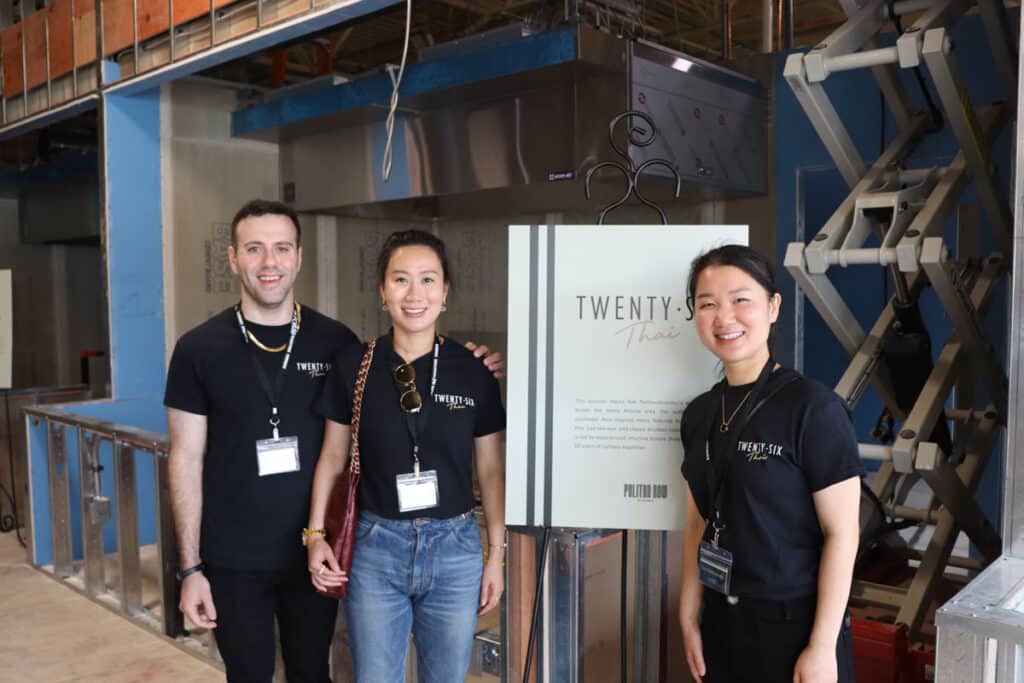
“There are certain types of produce and protein we try to source locally, but sauces and the more exotic produce and herbs, we have to import from Thailand,” she said. “Our brand is trying to move towards doing things locally and sustainably.”
Working with organizations such as Georgia Grown limits the use of large food distribution companies. Since starting Twenty-six Thai in 2016, Pattharakositkul has launched seven locations across metro Atlanta, including at Politan Row’s Ashford Lane and Colony Square.
The eatery describes itself as an “authentic wok-fired Southeast Asia-inspired menu featuring items such as pad Thai, pad see ewe and classic drunken noodles.”
Sheesh, a Mediterranean concept that uses simple, wholesome ingredients prepared with unique spices and blends, is run by corporate executive chef Charlie Sunyapong and director of operations Raquel Stalcup. The two are also members of the group behind full-service restaurants Stäge at Town Center and Pêche at the Forum.
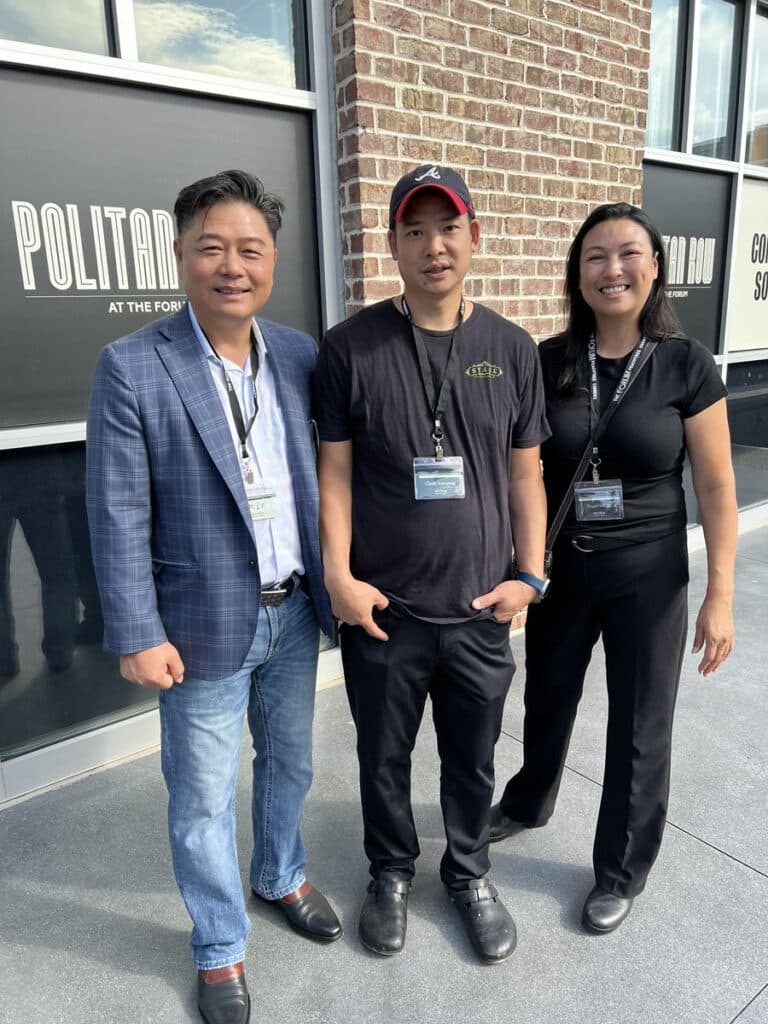
The popularity of those suburban concepts has already taken off. With Sheesh, they’re looking to do something different.
“There are going to be some things that are unique to Sheesh that you’re not going to get at the other places,” said Sunyapong. “You’re not getting a whole restaurant; this is quicker fare.”
Gekko Kitchen, a former food truck transformed into a hibachi and ramen experience, will be serving fresh, fast bowls that are more colorful and lighter than traditional hibachi fare.
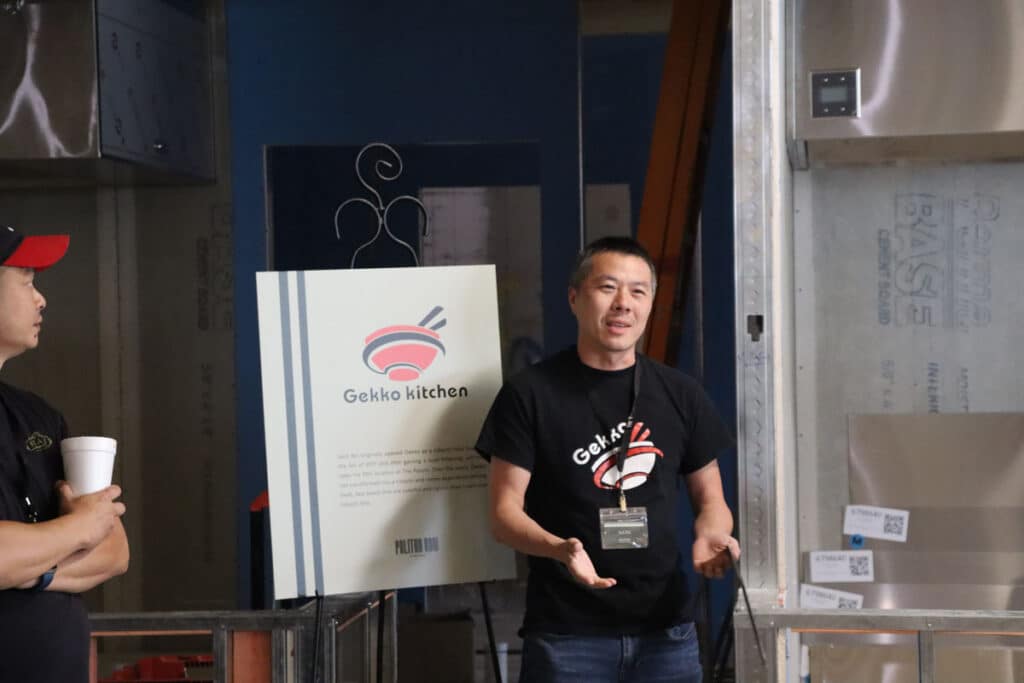
Gathering spots
Development Manager Nick Lombardo explained that NAP is moving away from building big construction projects from scratch like Colony Square in Midtown Atlanta and Avalon in Alpharetta.
“As a company, North American Properties pivoted around 2020 from building big ground-up construction to more redevelopment with already existing properties,” he said. “With the thought of great assets that just need a little more attention Infused into them to create value, we bought the Forum in 2022.”
He said that value-add propositions done at The Forum will create a more walkable center.
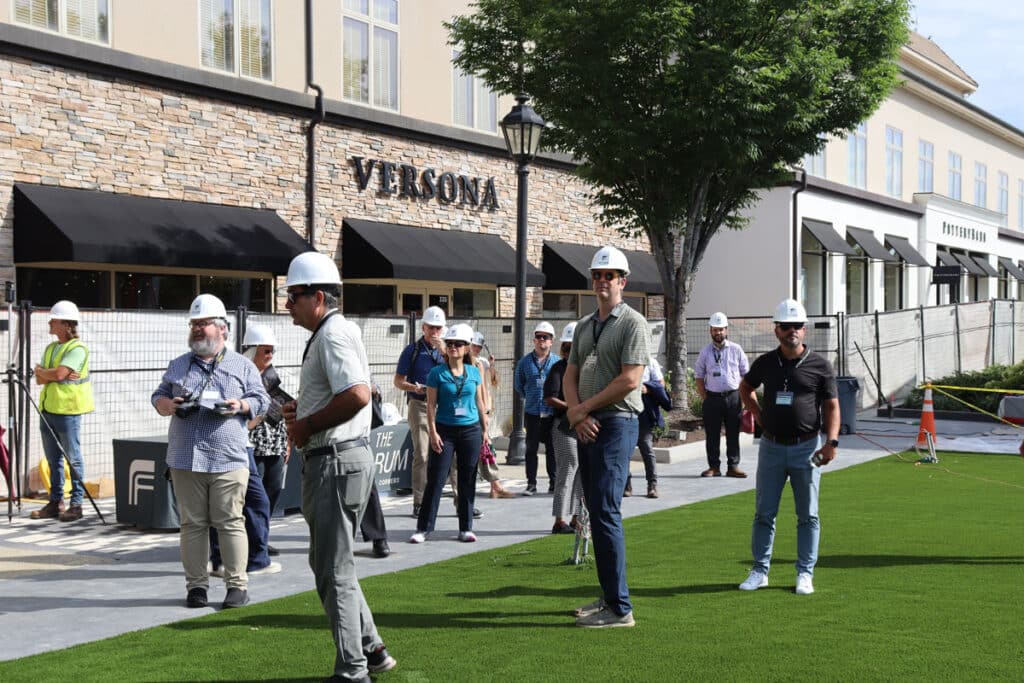
“Trying to compete with the internet on convenience is a very tough task, so the way we differentiate is by experiences,” he said. “We host between 150 to 200 events every year. We have things like concerts, wellness and fitness events and we have child playtime events. Our marketing team does a great job and they’re the differentiator when it comes to what makes our property stand out.”
By the first week of August, a large gathering space will be unveiled in the central area of the property between Pottery Barn and seafood restaurant Pêche. It will have a nine-foot LED screen capable of hosting movie nights and sports viewing. There will also be musical performances featuring local artists.
“We’re not in competition with Town Center,” said Charlotte Hinton, marketing manager at The Forum. “Town Center has gates like a real music festival and we’re more like a ‘chill and enjoy the music’ vibe where you can grab a beer and hang out or maybe kind of walk around.”
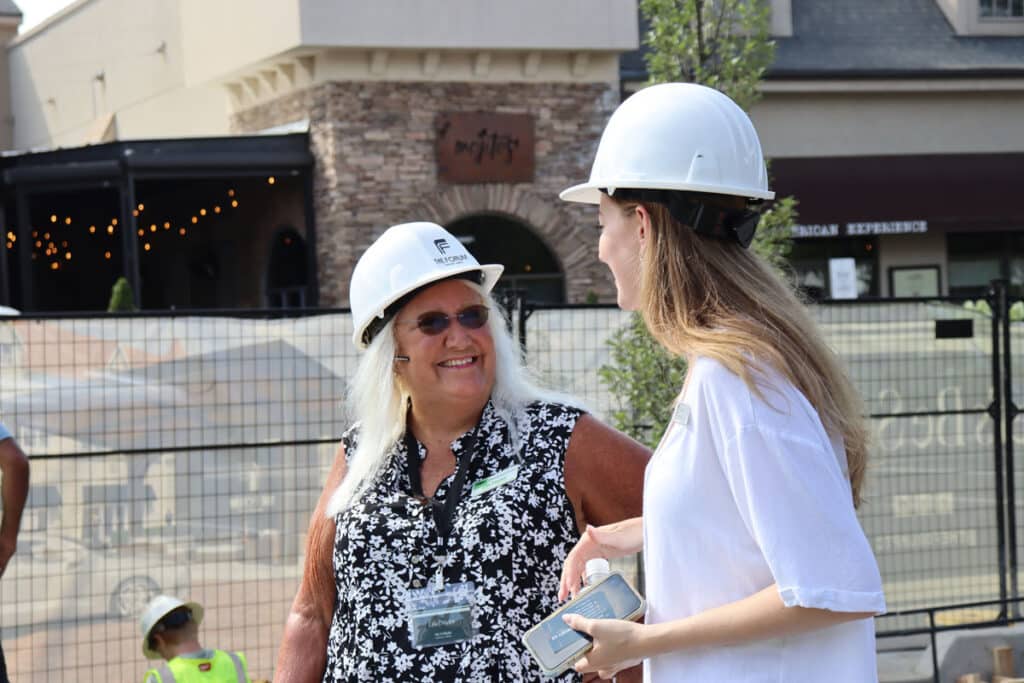
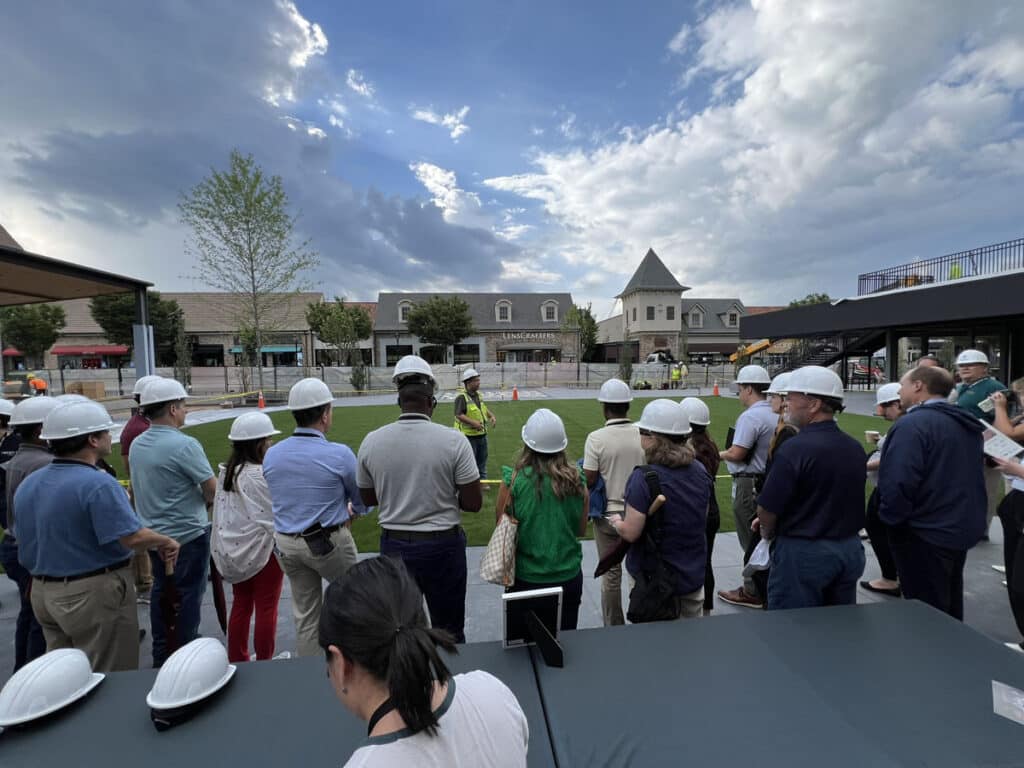
The smaller space and artificial turf are unlike the Town Center space where attendees spread blankets and bring chairs. The Forum will have furniture and seating in the space so folks can just gather and either enjoy time with family or partake in events.
The Forum will also offer valet parking on a limited schedule at that end of the property.
More improvements
Although the construction equipment will have moved out, the jewel box building will house a yet-to-be-named restaurant that will open early next year.
“We’re pretty much done with what we’re doing as far as landlord work,” said Lombardo. “We ask our tenants to bring their brand and their design and their material pallet and put that on the building to express their brand identity. They know their brand better than we do. They know how to best design their building and how it functions and works.”
It’s the same process with retail stores, he added.

“We always ask all of our new tenants to come in here when they’re building their storefront,” he said. “They’re not just selling their clothes; they’re selling a lifestyle in the brand so we ask them to push their brand out to the street.”
Even with the new spaces, there will be no shortage of parking, Lombardo added. “There’s plenty of parking behind these buildings,” he said pointing toward Pêche. “What we’ve done is enhance the connectivity to those areas. We’ve redone this breezeway and we’re adding lighting and connecting the parking lot to the main boulevard here. The goal is to replace cars with people and activity and bring a sense of community to the property.”
Related
Business
Taste of Peachtree Corners: PCBA Showcases Local Restaurants
Published
1 week agoon
July 17, 2024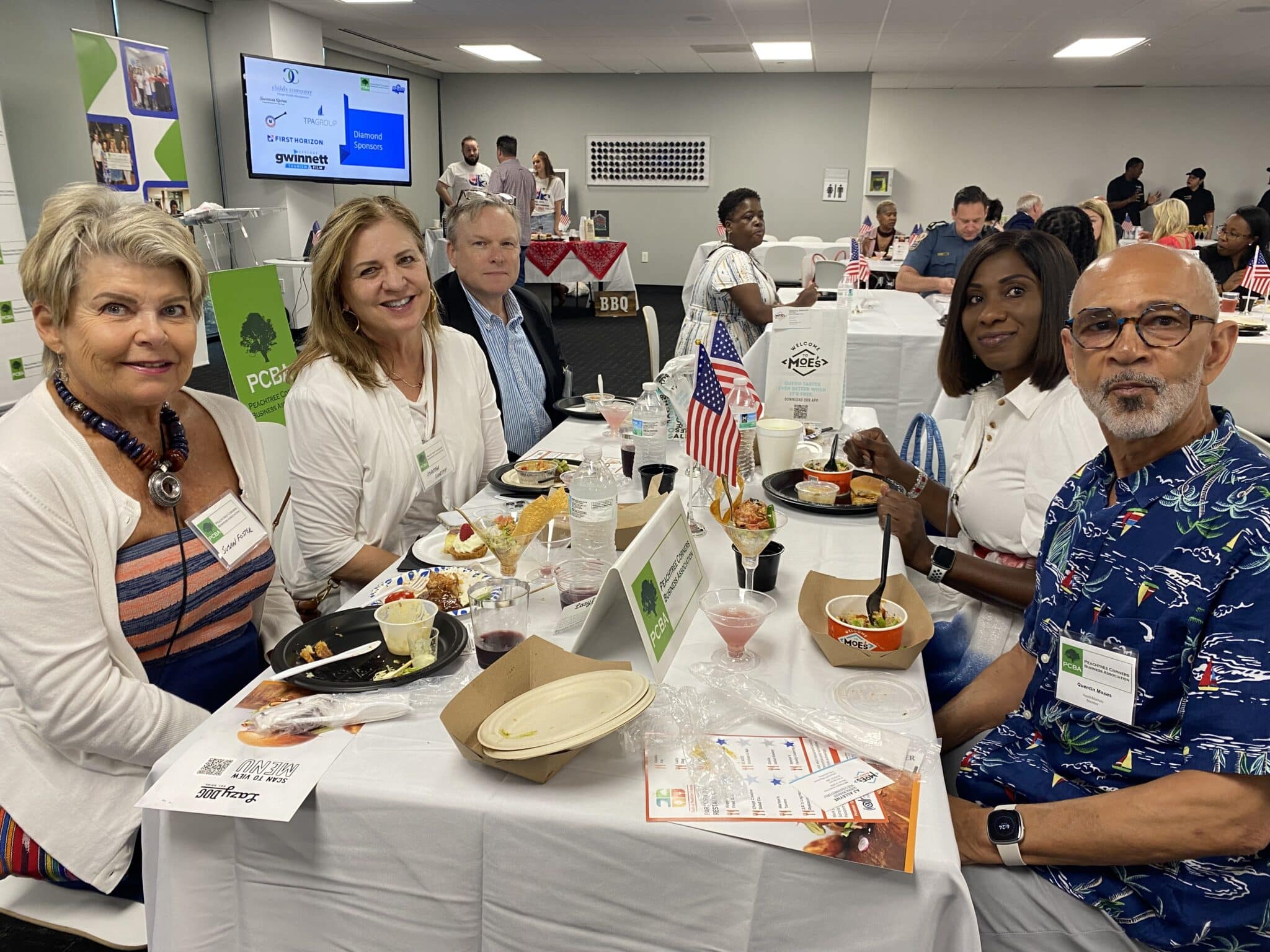
The Taste of Peachtree Corners has been in the works for years, but the COVID-19 pandemic put many key events on hold for the Peachtree Corners Business Association (PCBA).
But luckily this year, the dedicated staff of volunteers successfully executed a memorable event and introduced a lot of local business owners to their neighboring restaurants and caterers.
As I walked up to the Community Chest Room at Peachtree Corners City Hall on June 27, there was a line outside the door. I later found out that over 100 people had registered to attend the event. I got checked in quickly and was faced with a “passport” of 10 Peachtree Corners restaurants serving everything from high-end bakery items to good old-fashioned barbecue, and modern twists on seafood and American cuisines.
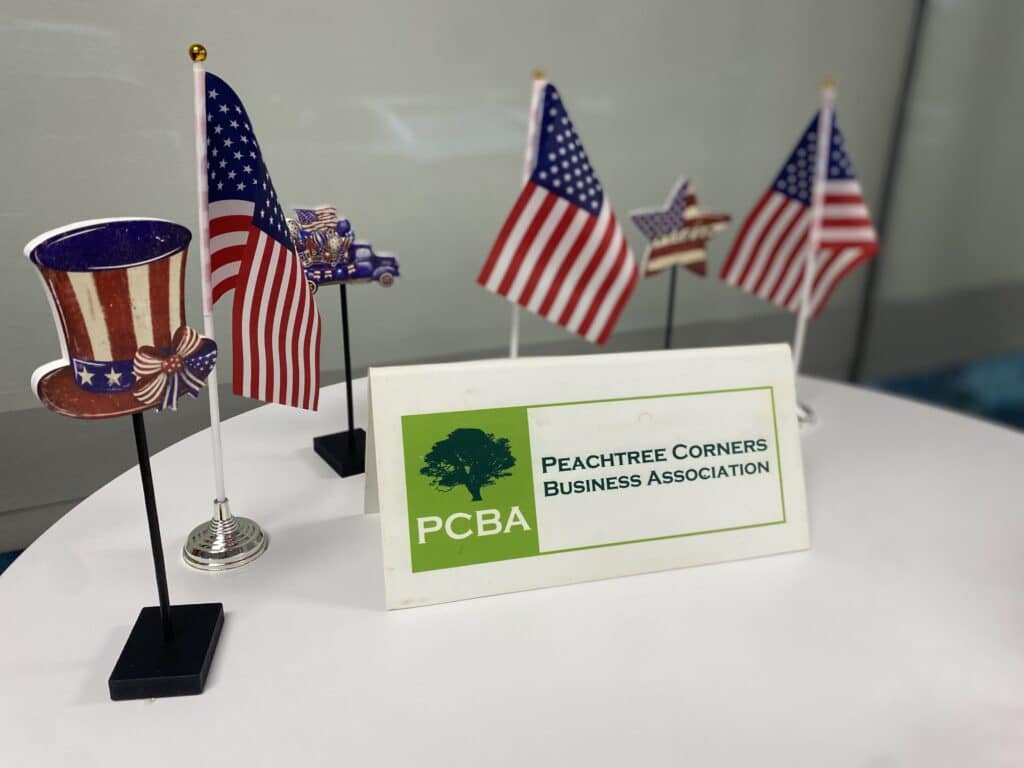
Let’s talk about the food
The idea was to visit all 10 restaurants and collect stars while trying samples and small plates. My first stop was Firebirds Wood Fired Grill, and they had my favorite – homemade chips and queso. The queso was smoky and mildly spicy with a great depth of flavor. What a great start. Next up was Chopt. Creative Salad Co. I had never heard of this restaurant before, but they blew me away with a perfect amuse-bouche of cherry tomato, pesto, mozzarella, and olive oil. These guys understand simple and fresh Mediterranean flavors.
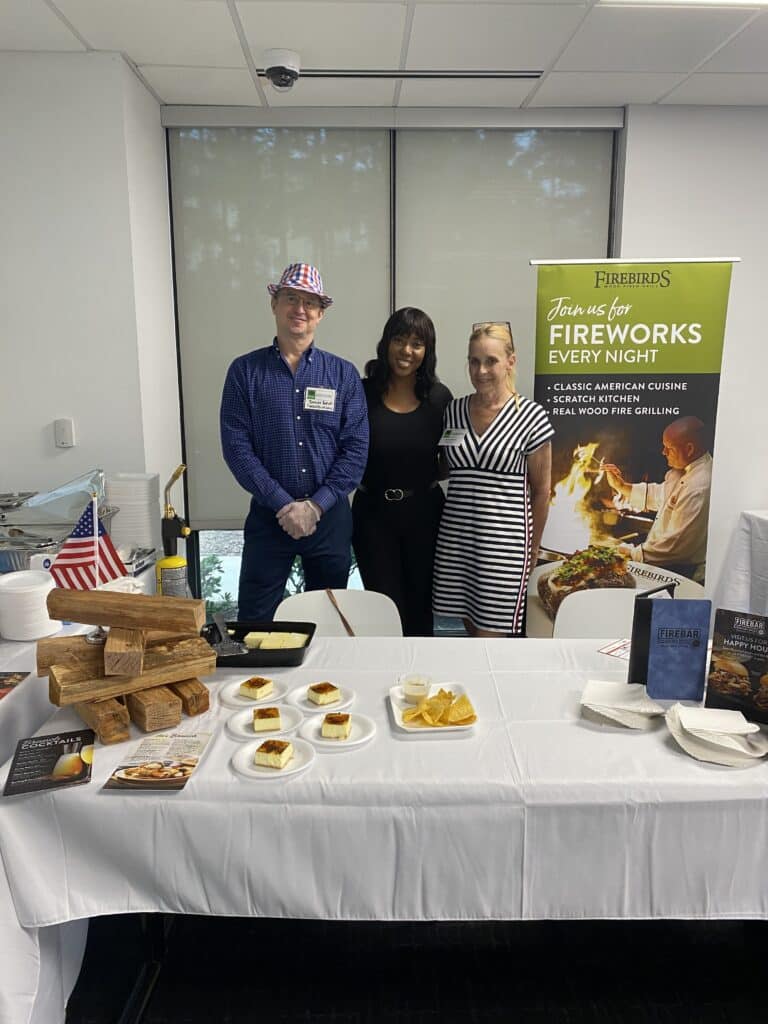
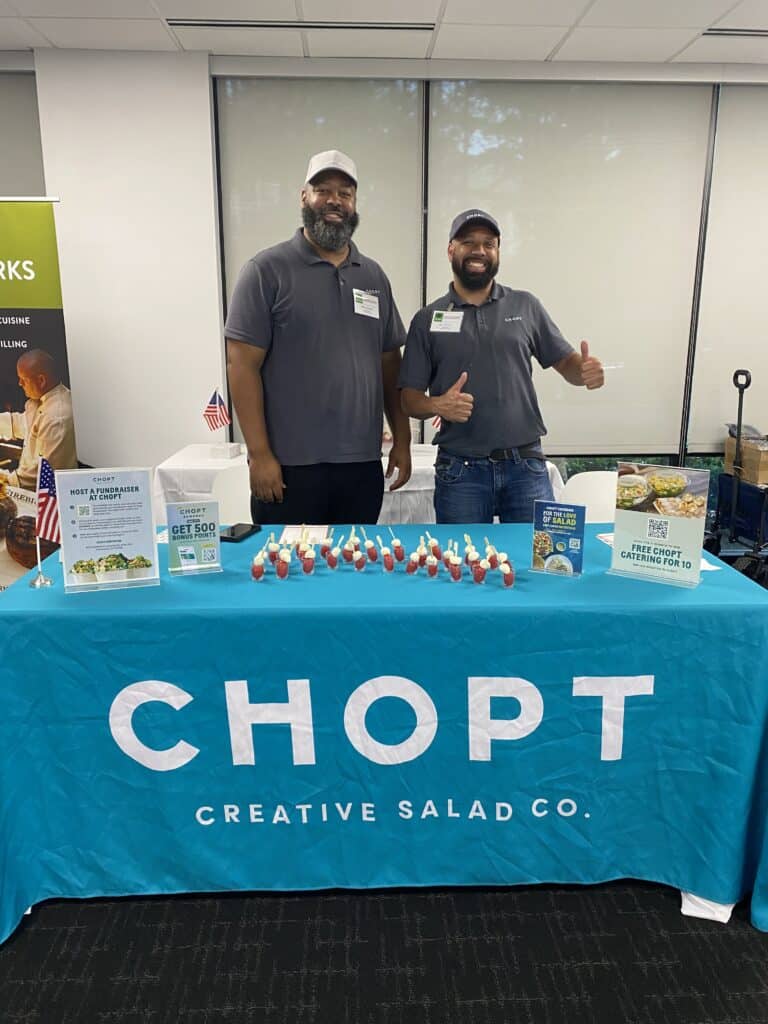

The folks from Marlow’s Tavern were also on-site serving shrimp and grits with jalapeno, spinach and tomato beurre blanc. This is definitely the style of elevated food I’ve come to expect from Marlow’s. And as a nice touch, they prepared a refreshing blueberry cocktail.
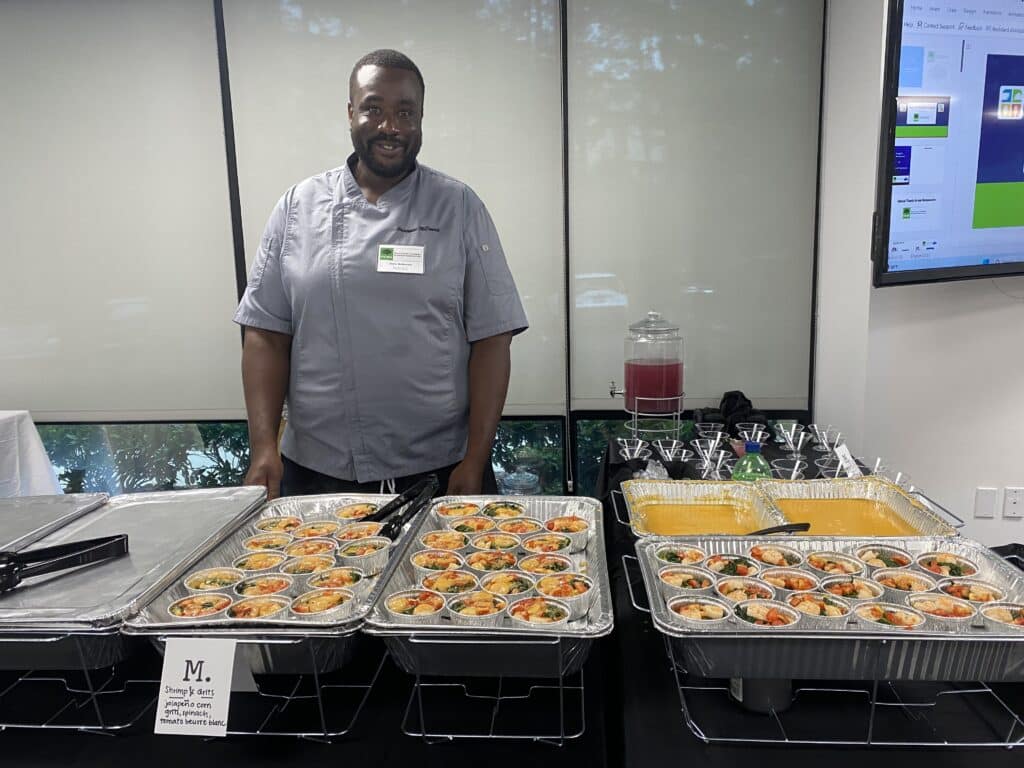
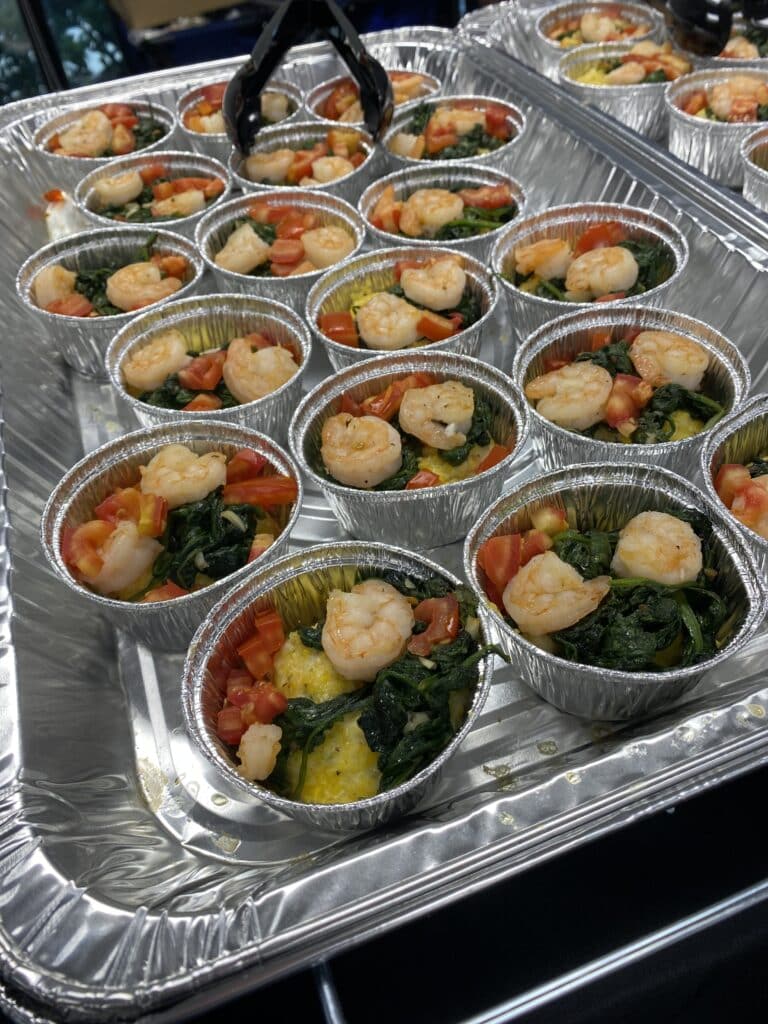
Another familiar face was set up on the other side of the room. J.R.’s Log House Restaurant served southern favorites like pulled pork sliders, baked beans and mac n’ cheese. I couldn’t pass this one up. The pulled pork was tender, tangy and saucy. Exactly what I want from a barbecue. Lazy Dog’s table really impressed me with its presentation. The tuna cup with rice, avocado and chili with chips on the side, was a real stunner.
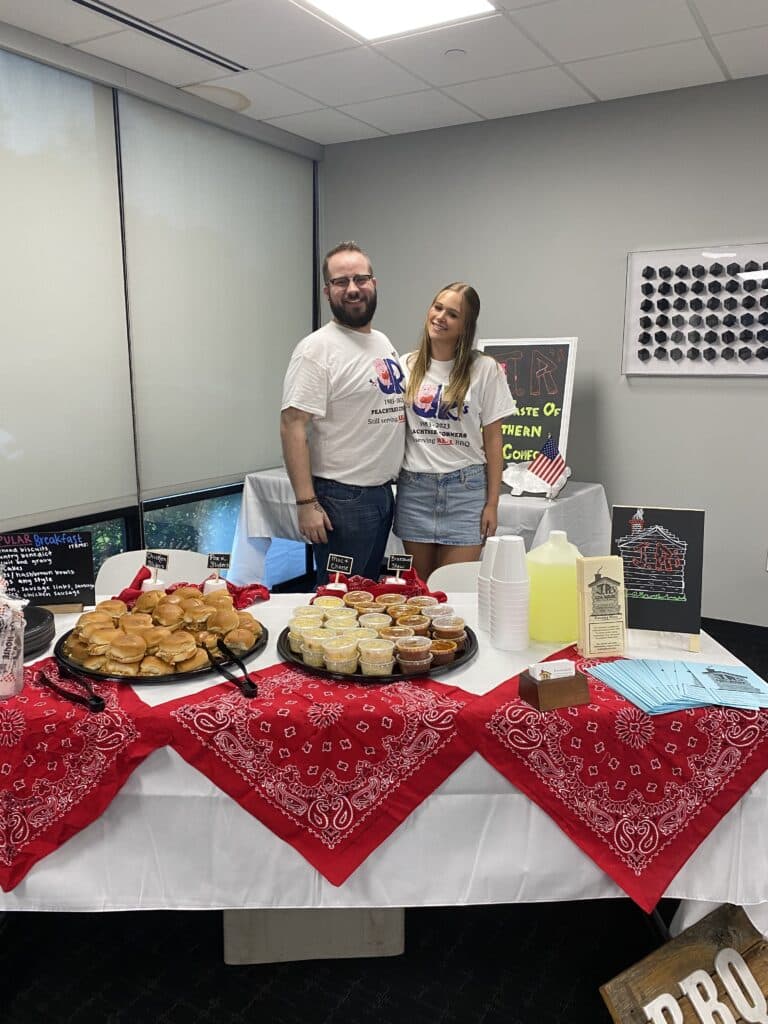
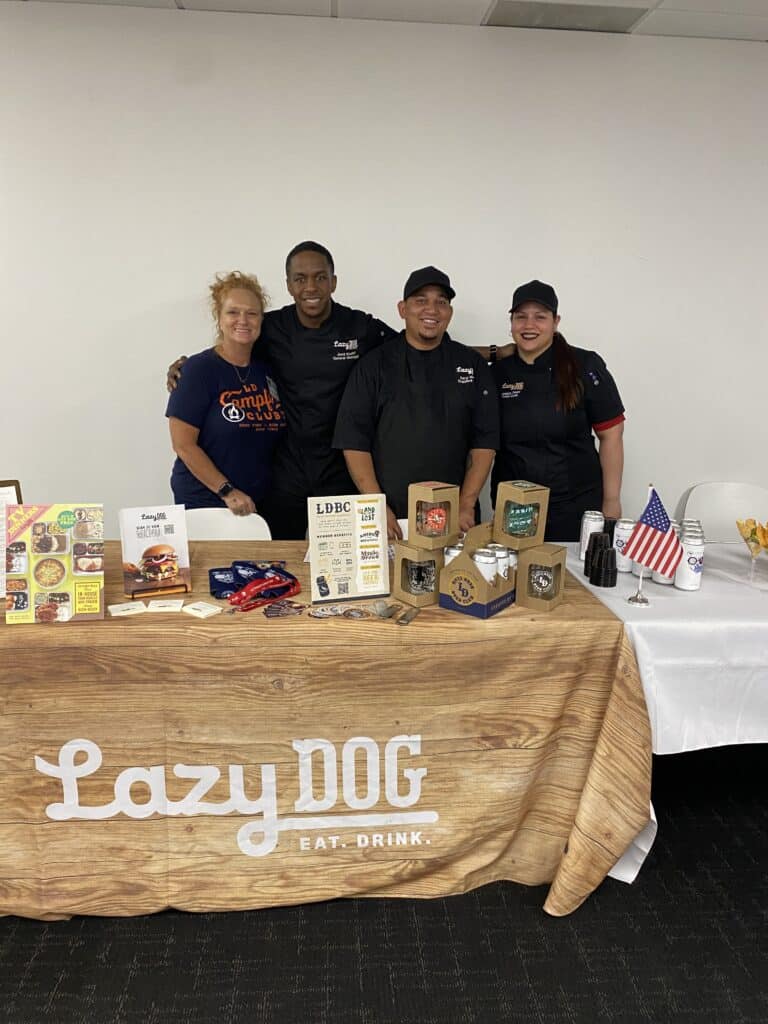
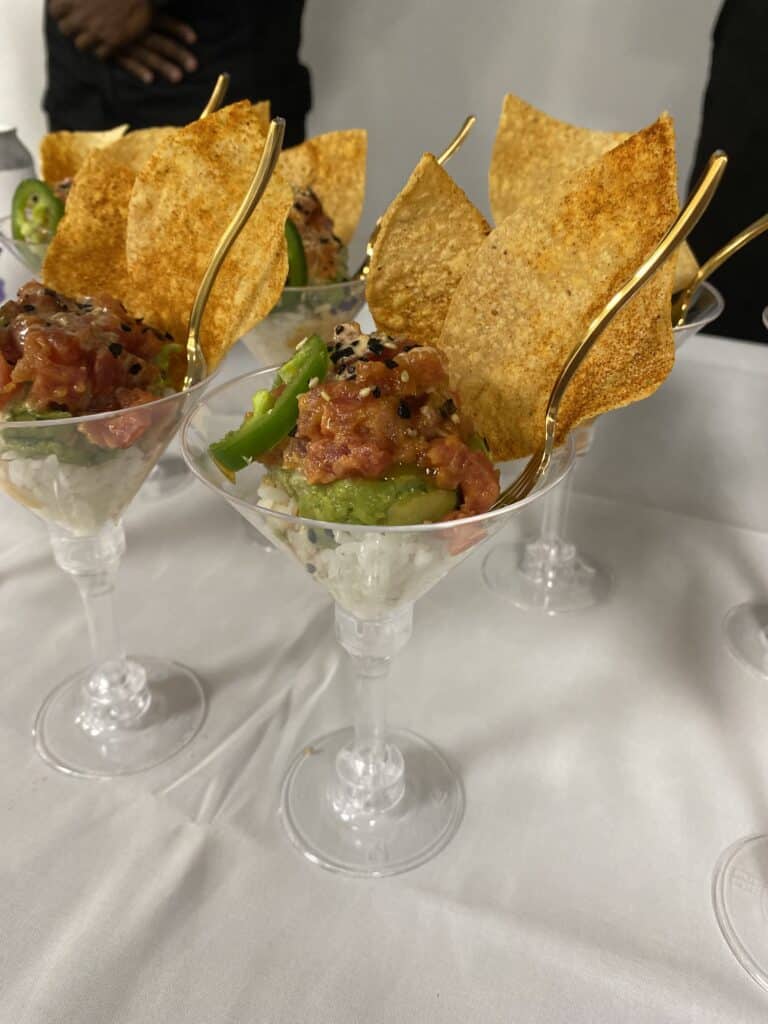
Moe’s Southwest Grill was also on-site handing out tasty tequila lime chicken with rice, avocado, and black beans. This super hearty and comforting entrée was followed by a seafood course from PECHE Modern Coastal. Crab cakes with a croissant pinwheel, roasted garlic and lemon aioli and arugula were on the menu and the flavor combinations were simply fantastic.
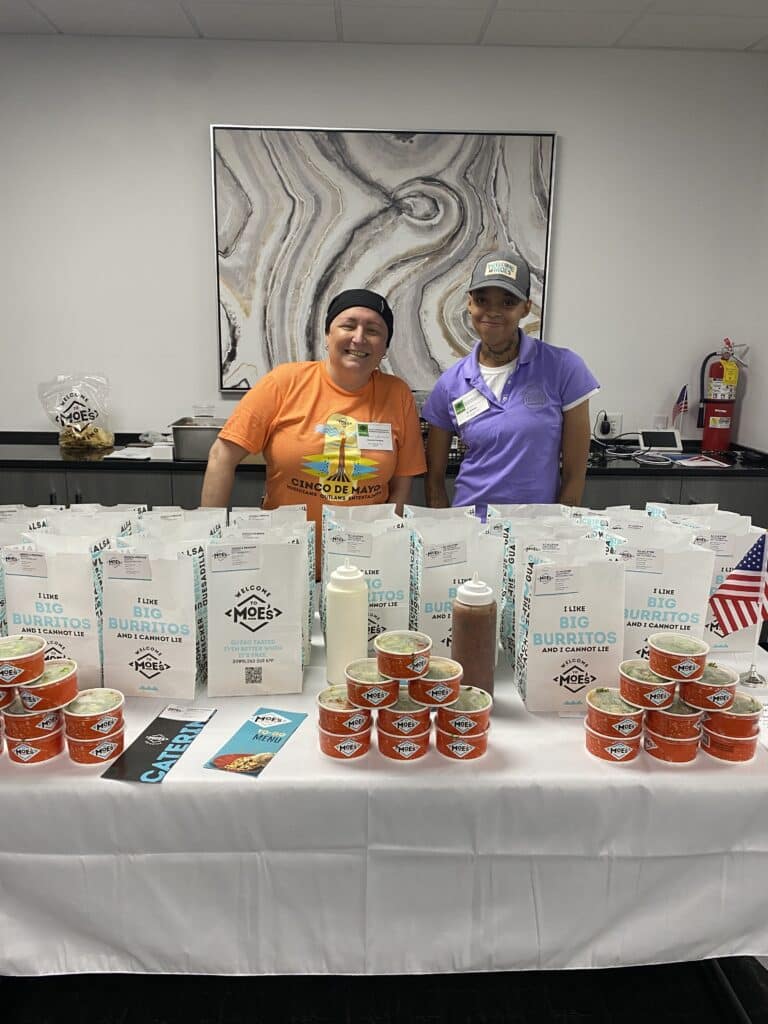
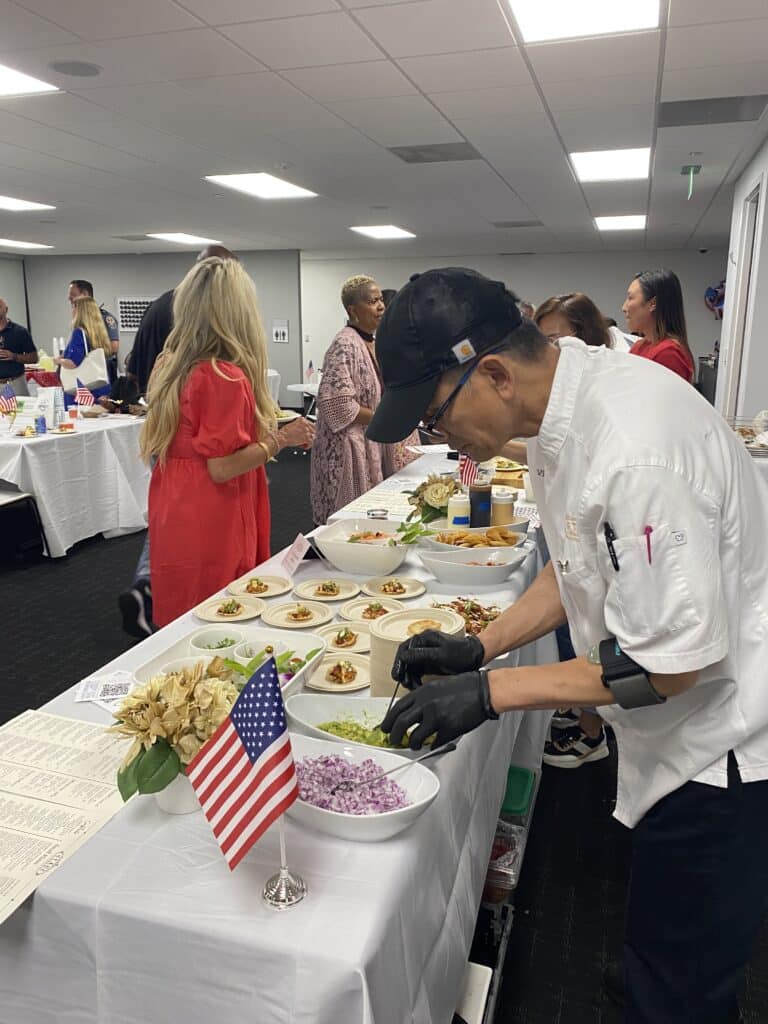
PECHE’s sister restaurant STAGE Kitchen & Bar was next door offering a tuna and salmon tostada with avocado, eel sauce, spicy mayo, and cilantro. This was easily one of my favorite bites of the night. The tostada was crunchy and light with clean and bright flavors. No kidding, I could probably eat this every day for lunch.
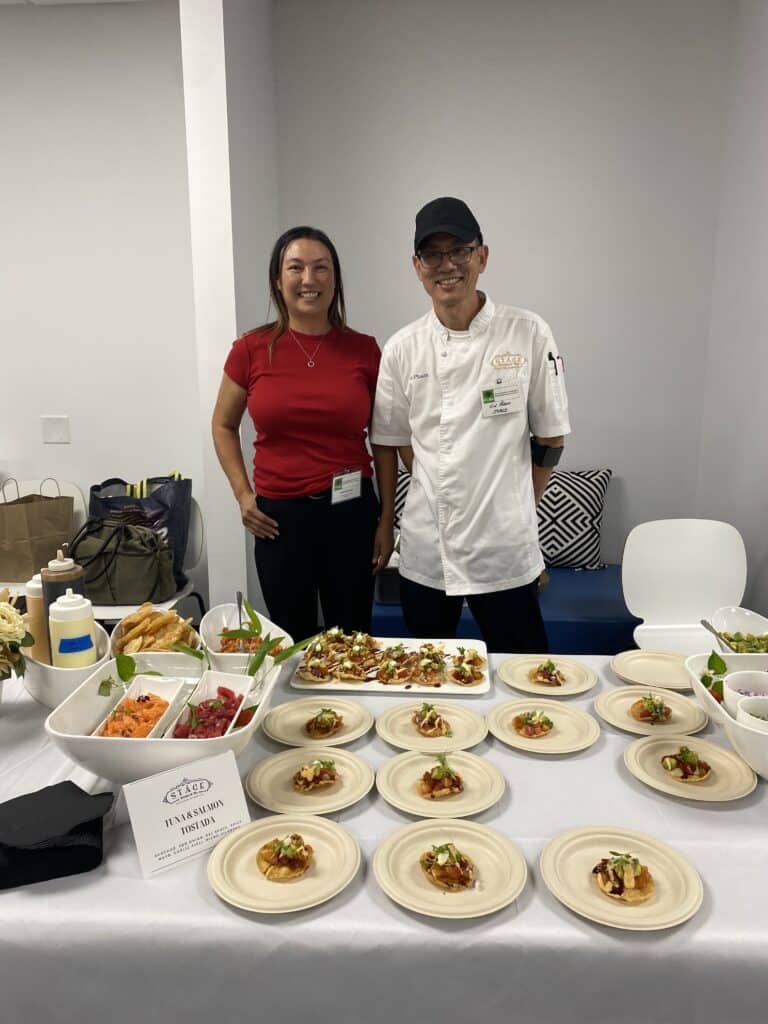
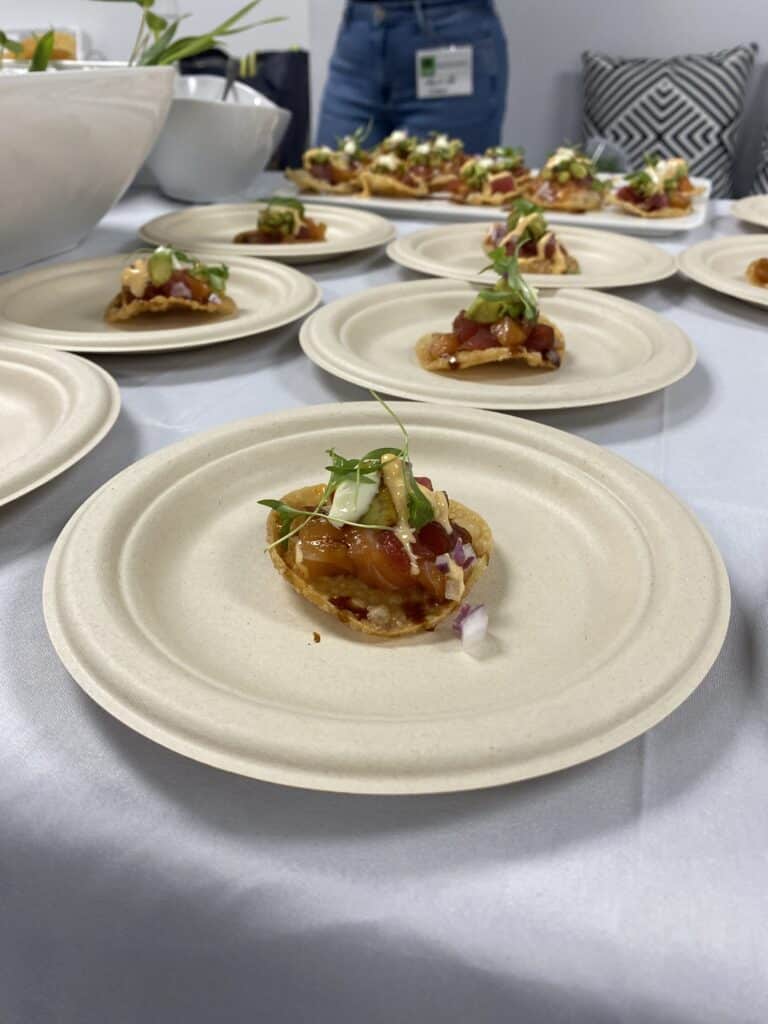
I moved on the Smoke’s Family Catering and owner Phillip Smoke had whipped up enough barbecue to feed an army. I had the pleasure of trying the smoked chicken with potato salad and it was the perfect pairing. Last but not least: dessert. I capped off the evening with a beautiful chocolate ganache-filled croissant with perfect lamination and flaky texture.
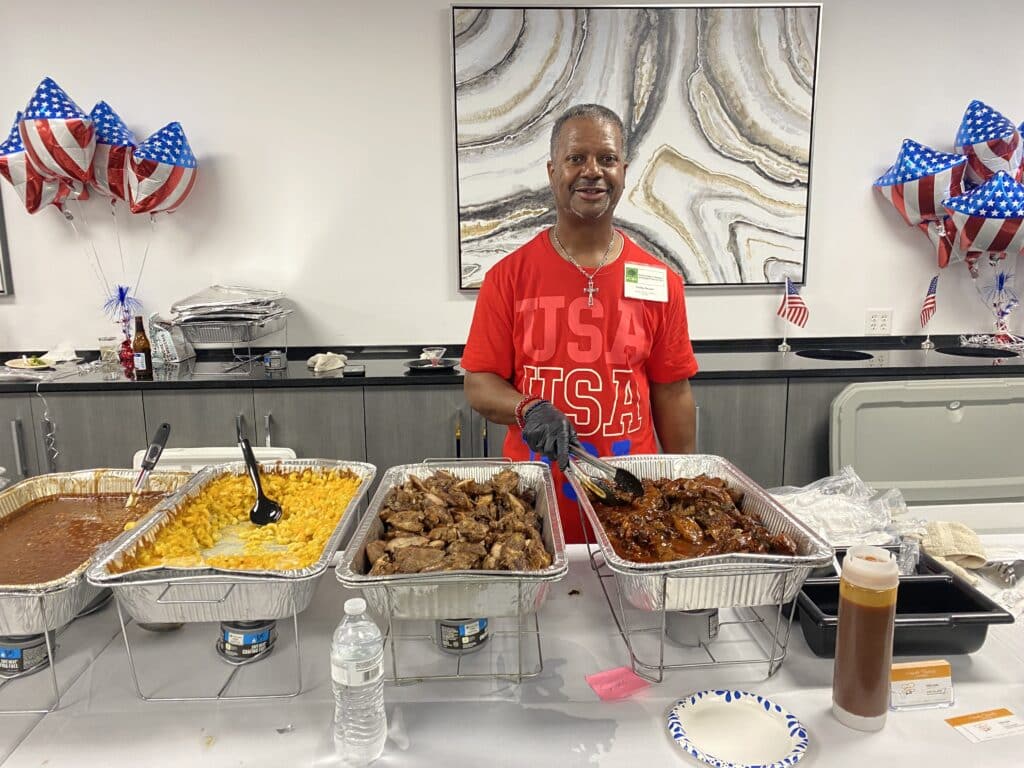
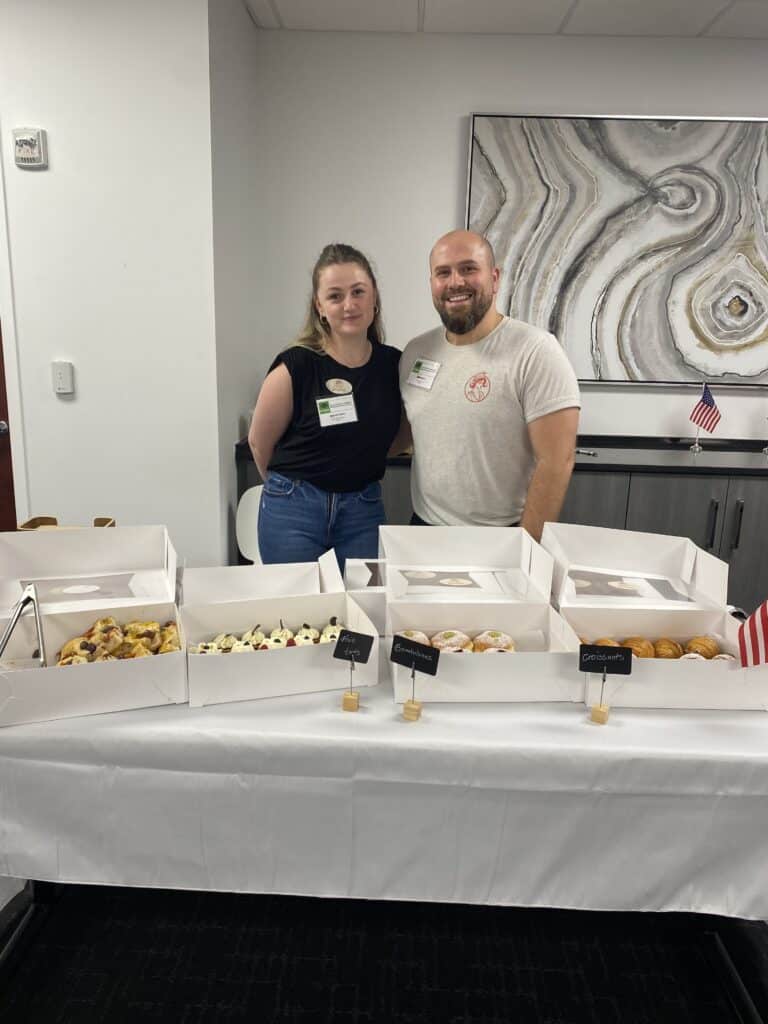
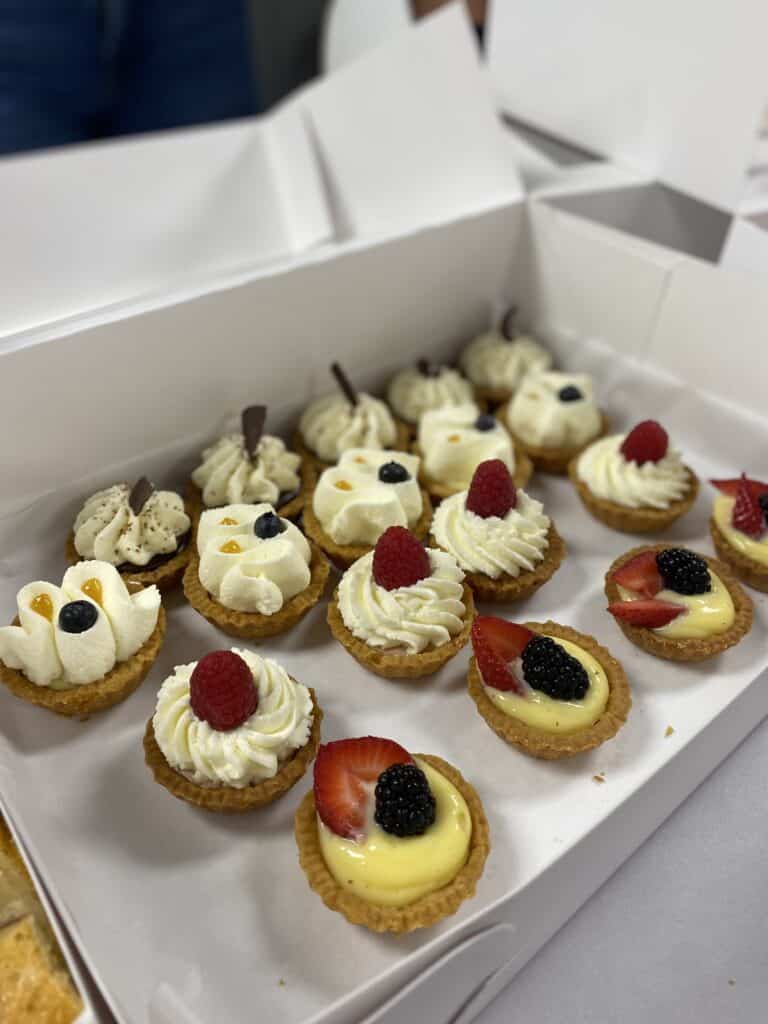
The inspiration behind the event
With a (very) full stomach, I caught up with PCBA President Lisa Proctor to talk about the event.
“We knew that COVID was really hard on a lot of our restaurants to get people back in,” said Proctor. “We wanted to do it in June because we wanted to celebrate our military. Everybody remembers them maybe on Memorial Day or different things, but June is the 80th anniversary of D-Day.”
“The military is always close to our heart,” she added. “We’re also very proud of our restaurants. They all have gone above and beyond.”
Tonight, the PCBA was honoring the Armed Forces and its brave veterans while bestowing two donation checks to very worthy causes.
The first check for $500 went to Folds of Honor. Since 2007, Folds of Honor has provided life-changing scholarships to the spouses and children of America’s fallen or disabled military. And now, their mission expands to the families of America’s first responders.
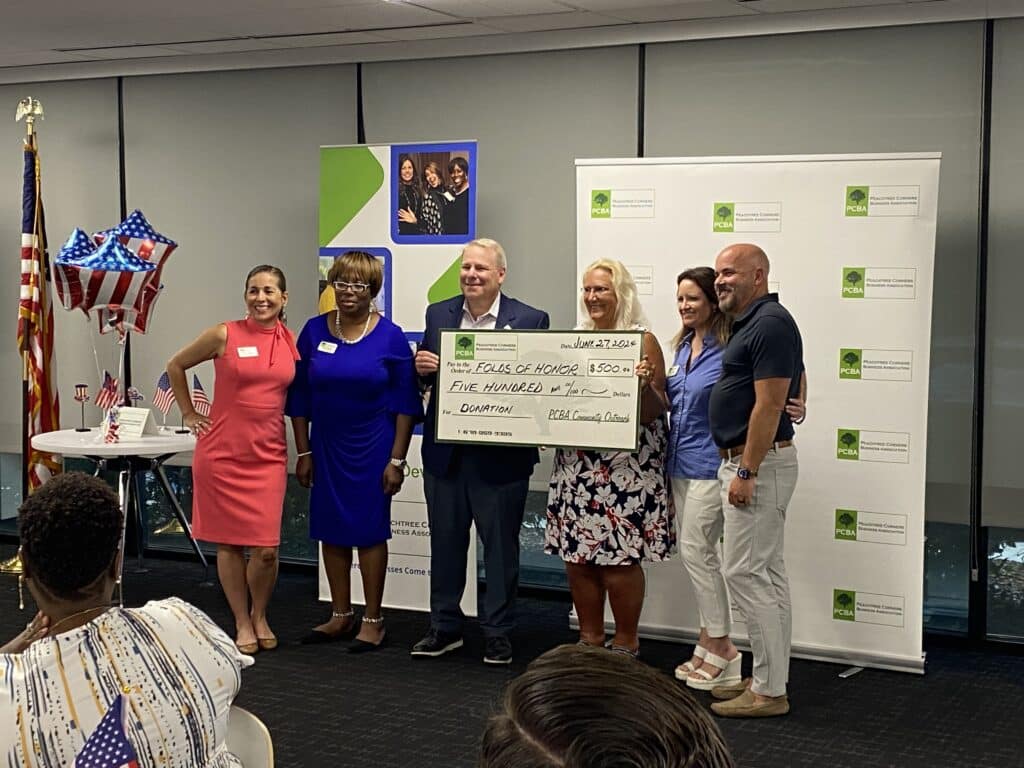
The second check for $500 was given to Light Up the Corners, a 501(c)(3) volunteer organization with an annual glowing, flashing, blinking, shining, nighttime running party and fundraiser in one. All proceeds from the event go to benefit less fortunate children and families in the Peachtree Corners community who are struggling by giving them the chance to participate in life-enhancing programs and activities at the Fowler YMCA.

Over the past 12 years, the PCBA has awarded 19 scholarships and donated more than $156,000+ back to the Peachtree Corners community.
Related
Business
Local Resident Opens AtWork Location in Peachtree Corners
Published
2 weeks agoon
July 10, 2024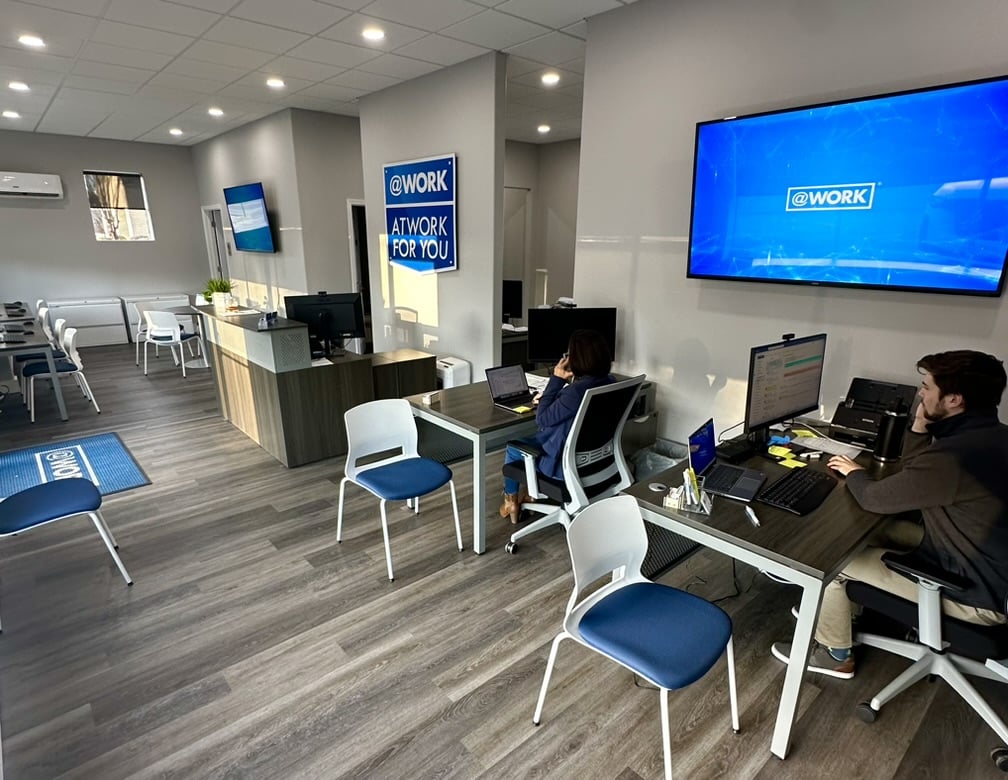
AtWork, one of nation’s leading staffing franchises, has opened its third Metro Atlanta location in Peachtree Corners, Georgia at 6185 Buford Highway, Suite E-100.
AtWork Peachtree Corners is locally-owned by Kamal Bhatia, an immigrant from India with decades of experience in hospitality and as the Senior Vice President of Operations of Atlanta-based Action Bartending School.
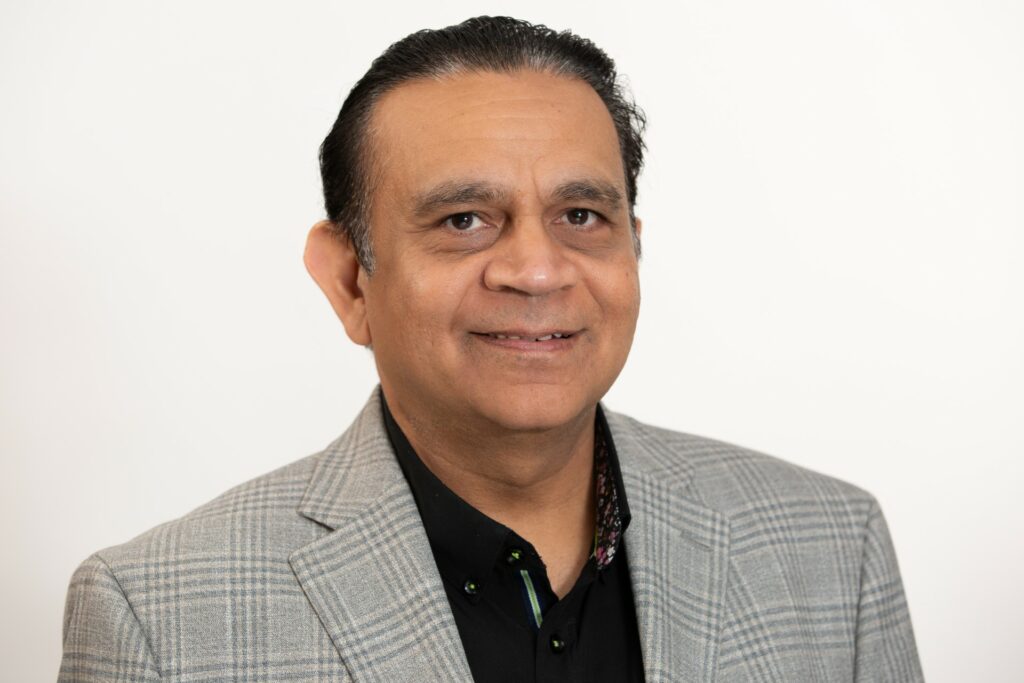
“There is an incredible need for AtWork’s services in Peachtree Corners,” said Bhatia. “Since migrating here in 1996, I’ve witnessed Atlanta evolve and sprout new communities north of the city, including my own. Peachtree Corners has become a hub for thriving businesses, and my goal with this location is to be a key resource between companies and job seekers to support the continued growth of our local economy.”
Bhatia’s son and daughter will assist him in the business.
“This is an opportunity to create a legacy company to ensure our community is supported for generations to come,” he said.
For more than three decades, AtWork’s mission has been to connect people with jobs and jobs with people. With more than 100 locations nationwide, AtWork puts nearly 40,000 individuals to work each year in administrative, light-industrial, accounting and finance, hospitality, IT and management-level positions at some of the nation’s largest and most recognizable companies.
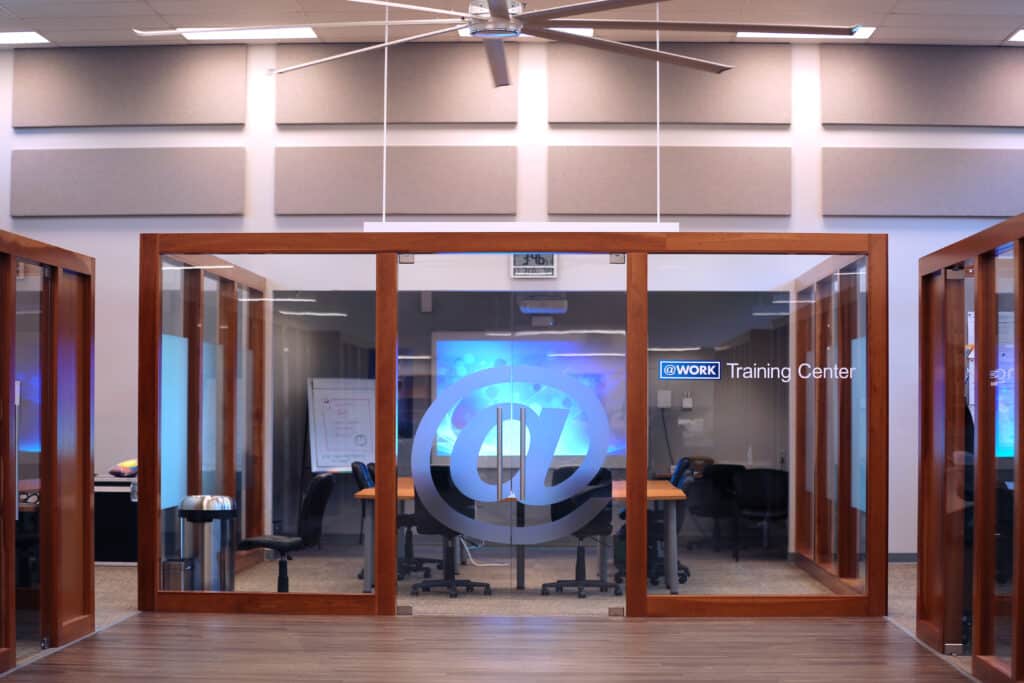
“We’re proud to open our doors in Peachtree Corners and provide a common place for both job seekers and growing businesses to turn for staffing solutions,” said Jason Leverant, President and COO of AtWork.
“AtWork will serve as a key resource to help employees thrive, businesses prosper and communities flourish. Kamal is the perfect partner to champion our mission and be a servant leader in her local community,” he added.
Related
Read the Digital Edition
Subscribe
Keep Up With Peachtree Corners News
Join our mailing list to receive the latest news and updates from our team.
You have Successfully Subscribed!

What’s going on at Jones Bridge Park and the Challenges of Urban Development

Taste of Peachtree Corners: PCBA Showcases Local Restaurants

The Forum Gives Sneak Peek of New Eateries and Community Spaces

Southwest Gwinnett Mayors Share Visions for the Future

8 Events Happening In and Around Peachtree Corners This August

Peachtree Corners Shines Bright with Light Up the Corners Glow Race this August

Peachtree Corners Shines Bright with Light Up the Corners Glow Race this August

The Forum Gives Sneak Peek of New Eateries and Community Spaces

8 Events Happening In and Around Peachtree Corners This August

Southwest Gwinnett Mayors Share Visions for the Future

Taste of Peachtree Corners: PCBA Showcases Local Restaurants

What’s going on at Jones Bridge Park and the Challenges of Urban Development

Local Resident Opens AtWork Location in Peachtree Corners

CHRIS 180 Expands its Services into Gwinnett County [Podcast]

Light up the Corners [Video]

Capitalist Sage: Business Leadership in Your Community [Podcast]

Cliff Bramble: A Culinary Adventure through Italy

Top 10 Brunch Places in Gwinnett County

A Hunger for Hospitality

THE CORNERS EPISODE 3 – BLAXICAN PART 1

Top 10 Indoor Things To Do This Winter

The ED Hour: What it takes to Remove Barriers from Education
Peachtree Corners Life
Topics and Categories
Trending
-
Business1 week ago
Taste of Peachtree Corners: PCBA Showcases Local Restaurants
-
Business2 days ago
The Forum Gives Sneak Peek of New Eateries and Community Spaces
-
City Government4 days ago
Southwest Gwinnett Mayors Share Visions for the Future
-
Around Atlanta4 days ago
8 Events Happening In and Around Peachtree Corners This August







